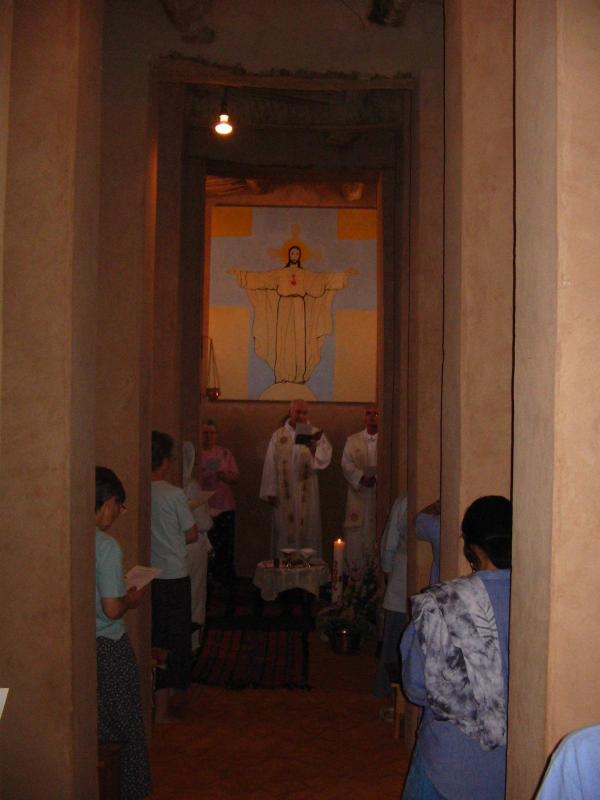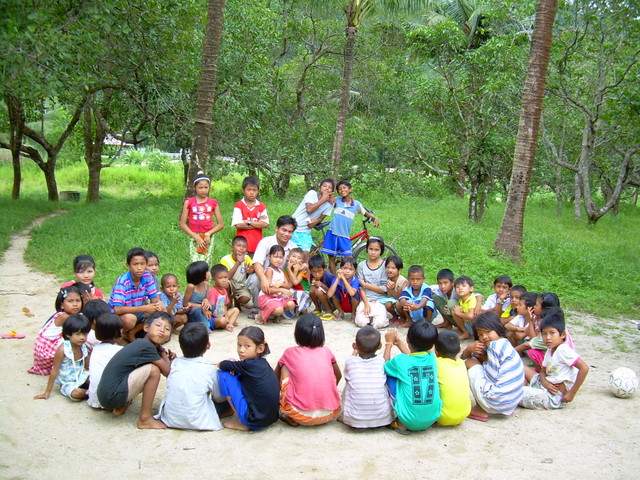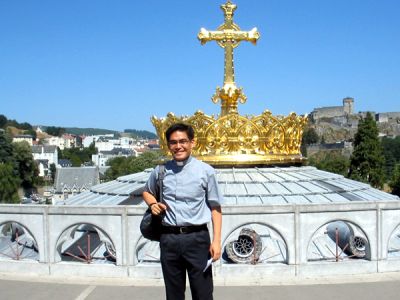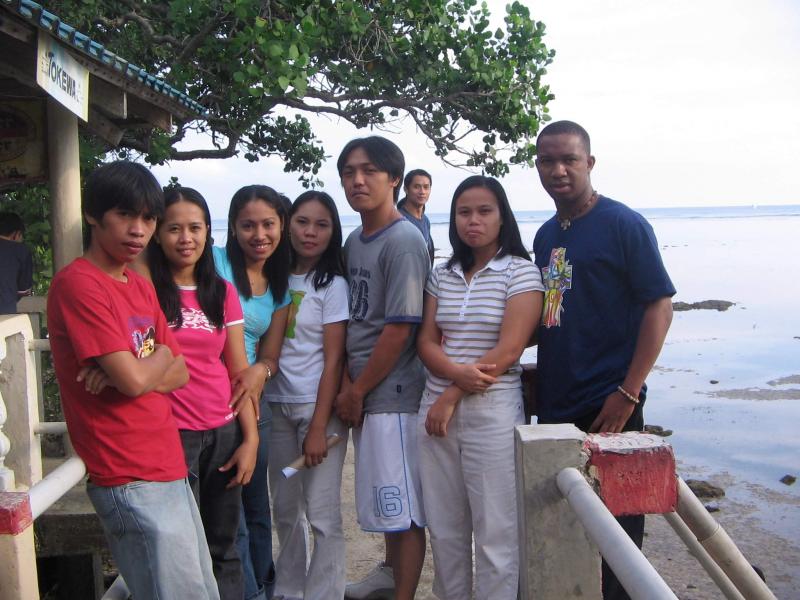January-February 2007
A Catholic In The World
By Peggy Noonan
This article first appeared in The Magnificat Pilgrim’s Guide for the Great Jubilee, Diocesan Supplement for the New York Archdiocese, 2000. The website of Magnificat, a monthly Catholic worship booklet, iswww.magnificat.com
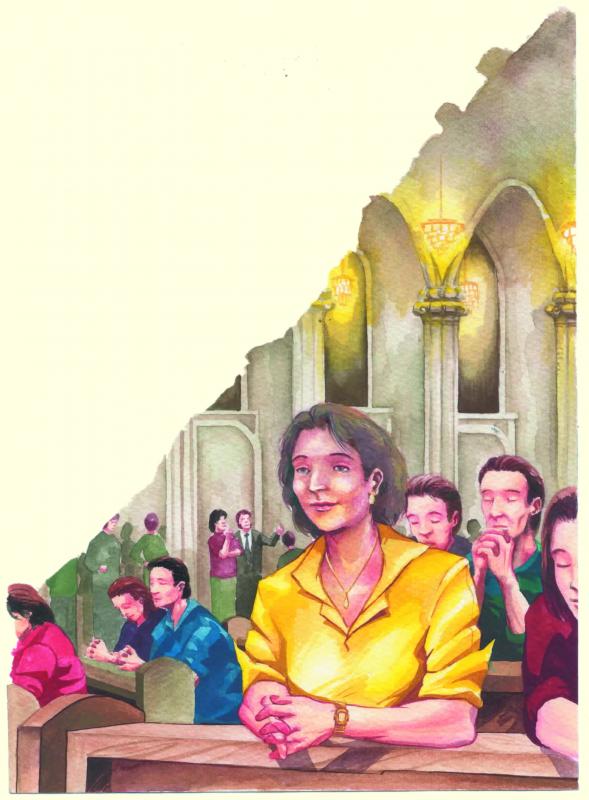
Recently I popped into St Patrick’s Cathedral after a morning business meeting in midtown Manhattan and realized as I walked in that it must already be noon, for Mass had begun. So I walked down the center aisle and joined a hundred or so people scattered throughout the pews. I don’t go to Mass at St Patrick’s very often and was struck that the worshipers there were ‘there’ – they were listening, responding, and didn’t seem distracted by the milling tourists just beyond, who were chatting, walking about, and looking at statues. So I tried to be there too, and found it surprisingly easy. But now and then I’d look up and see tourists, small groups of whom were standing and watching us. I think they may have been thinking what I used to think when I’d wander into a church and accidentally came upon a Mass. ‘Boy, there are people worshiping God here in the middle of the day. How interesting. This is like going to a museum where you see what people used to do.’ In those days I saw the people in the pews as Representatives of Modern Christianity. So now I improved my posture and tried to look absorbed for them.
Faith in the modern world
Later I thought that little moment in the Cathedral might serve as a metaphor for the position of those who try to live their faith in the modern world. They do the small and unexceptional things they do, and the world now and then strolls by and notices and thinks, ‘How interesting.’
I do not find the little piece of the world in which I live to be hostile to Catholicism, or rather hostile to Catholics trying to lead Catholic lives. I find people in general to be wondering, and interested. My closest friends are largely non-Catholic and mostly agnostic, and they are both curious about my belief and respectful of it. Many of them ask questions, very specific ones about prayer, about what happens in the Mass and what it means. Sometimes I don’t know the answer and call around to get it and report back. You can learn a lot this way. Sometimes I improvise. Once a friend needled me mildly about the Virgin Mary and how some question the high place we give her. My friend was politically of the left, so I sighed and said, ‘Yes, sexism is a force in the world and we have to help people appreciate Mary’s power and not fear and resent it.’ There was silence for a moment, and then she started to laugh. ‘That was good,’ she said.
I feel free to tell them of my struggles. I tell them I adore Jesus and know that he is real, which is a real gift, and that the bumper sticker speaks for me: ‘My boss is a Jewish carpenter.’ And yet I find it hard to love him. I ask to love him because I know it’s important; I should and want to and feel I must. This, the difficulty of love, makes them think of parallel struggles in their own lives, with people they know and are related to. I tell them what I want is to be a Filipino woman, for all of them I know who are practicing Catholics seem lifted by their faith; it infuses them. I see them at Mass or doing the Stations, and they are of Jesus, in Jesus, with Jesus; they’re lit with him. They are what the Irish used to be. I want to be like that again.
Hard truth and comfort
Sometimes when I speak of my faith, I perceive on the part of my friends a wistful, ‘It must be nice to think like that.’ Now and then I think I perceive the kind of approval that makes me think of grand old New York dowagers, Edith Wharton ladies, talking about the help: ‘Bridget’s a fervent Catholic, Mass every morning at 6’ meaning she’ll never steal; she’s disciplined; and you never know, these peasant-ish religions can affect a house in positive ways! Now and then, not often, I feel a little patronized. ‘Your faith must be a great comfort to you,’ an agnostic lady of great brilliance said to me a few years ago. Without thinking about it I said, ‘Yes, it is.’ Then I caught something in her tone, and realized she meant, ‘Life is a challenge, and we all need our consolations, and if that works for you, then go for it.’ So I said that actually what I need is truth; if I wanted comfort there are other ways to go; but yes, the Christian paradox is that if you go for hard truth you get real comfort. Unlike the other forms it isn’t transient and passing; it stays.
The better way
I love my friends and pray for them and ask them to pray for me. I think I am for them like one of the people in the pews in St Patrick’s, and they are watching – interested for a moment, maybe a little bemused, a little yearning. I try to remember to stand up straight for them, I try to remember to be unselfconscious, to be absorbed, to be true. I often fail. But I know I am trying to be for them what the Filipino women are for me: a reminder, an inspiration, a hint that there’s another way and that it’s better.
Peggy Noonan is the best selling author of seven books on American politics, history and culture. She is a contributing editor of The Wall Street Journal and a weekly columnist for the Journal’s editorial page website. Her articles and essays have appeared in Forbes, Time, Newsweek, the Washington Post, the New York Times and other publications. Her most recent book, John Paul the Great: Remembering a Spiritual Father, was published by Viking in November, 2005. When Character Was King: A Story of Ronald Reagan, published by Viking in November, 2001, was a New York Times bestseller.
A Stranger Befriending Strangers
By Gracia Kibad
Gracia Kibad, a Columban lay missionary from Bauko, Mountain Province, is now in her third term in Ireland.
In my second term in Ireland I was assigned to Ashbourne (www.ashbournedonaghmore.com), Meath. The recent waves of migration have brought people from many countries to its doors, making Ireland at this time particularly interesting.
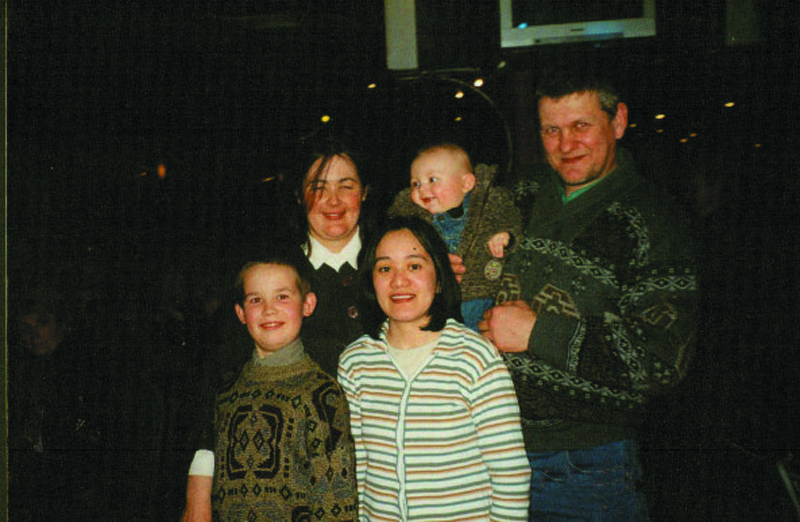
Gracia with the Batorov family
Being a foreigner, I was faced with my own uniqueness whenever I encountered those different from me in color, language and culture. Living in a multicultural community called for a deeper affirmation of my identity as a Filipina.
My initial involvement with the residents was accidental. Parish priest Fr Jim Lynch, who worked in Zambia for a while, chats with newcomers he meets on the street and used to tell me who he’d met. As a stranger in a different culture, I felt a certain concern for these. Soon I found myself keeping in touch with them. When I’d see someone who looked like a migrant I’d just go and talk to them. This wasn’t easy for me as I didn’t want to be mistaken as ‘nosey.’ But I learned on mission to do the unusual. It’s great to be a ‘foreigner’– there’s always room for some ‘oddities.’
Spirit of Welcome
I came to know and befriend people, some Muslim, some Christian, from places such as Kosovo, Latvia, Lithuania, Nigeria, Zimbabwe, Ukraine, Moldova – and the Irish themselves. Around this time, the parish set up a team to welcome new people in the community. At first we linked up with the national ‘KNOW RACISM’ program but later called ourselves the ‘Ashbourne Welcoming Group.’
We organized Masses to welcome migrants, and also held coffee-mornings and similar get-togethers, to which locals came. Parishioners appreciated these initiatives that allowed for a more open encounter between people who didn’t know much about each other but who wanted to. I also welcomed people to my own place. Hospitality was one thing I was able to offer and I saw it as one aspect of being on mission.
I also visited people in their homes and always got a warm welcome. Our difficulty in speaking English was something that made these encounters more interesting and challenging.
Slices of life
I remember visiting the Batorov family from Ukraine. The husband worked in a local factory. Since their arrival in Ireland, they’d had a baby who was baptized in the parish church. Mrs Batorov knew very little English. We were trying to communicate through ‘sign language’ when their 8-year-old son arrived from school. Thanks be to God for an efficient Irish school system. After less than a year in school his English was perfect. Immediately he ‘got a job’ as our interpreter. On top of that, this huge, gentle Ukrainian woman persuaded me to have dinner with the family. As with Filipino hospitality, no matter how little people have, there’s always something to eat for whoever comes to the door unexpectedly. And so it is with the ‘cuppa,’ as the Irish call a snack over a cup of tea. When I was leaving Ashbourne, the whole Batorov family came to my despedida. To my delight and surprise, they handed me a framed painting.
I got to know a Kosovar, a friend of Save, a Fijian Columban lay missionary in Ashbourne before. Every time we chatted, he’d tell me something about his dear homeland, Kosovo, and his family and friends, alive and dead. Being away from home myself I could imagine the pangs of loneliness and homesickness he felt, how much more for this man who had to flee home for his life. For him Kosovo would always be the longed-for place, yet not knowing when it would be safe to go home to.
One evening, I decided to drop by the apartment where he lived with his wife. When he opened the door he looked so upset and tears began to roll down his cheeks. I tried to calm him. He had been watching TV that evening and recognized a friend of his being captured. I couldn’t fully understand what he was saying because of his difficulty in speaking English, but I gathered that his friend had been betrayed. He was distraught at his helplessness in the situation. I stayed for a while till he was calm. Stories such as these make me wonder what we as a human race are doing to our own. And we don’t really know how people are till we listen to their stories and try to understand them.
Lessons in cultural diversity
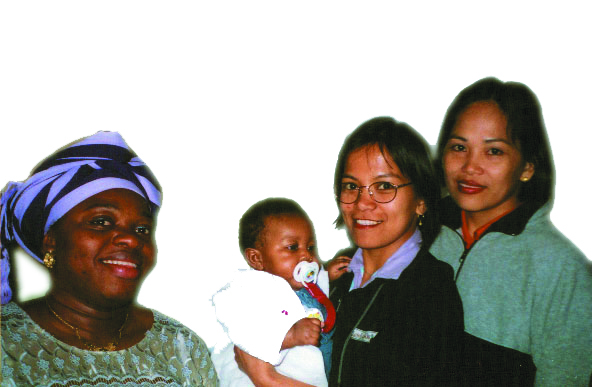
Sylvia and baby Angelica with two Filipino migrant workers, Maria Isabel and Maria Agnes
Before I left Ashbourne, my Kosovar friend and his wife came to say goodbye. With sadness in his eyes he said, ‘At least you can go home.’ I now understood those words, having learned a part of his story. As I reflected on them, I could say that indeed I was blessed, as home is always there for me, a home that is safe, where I’m assured of a warm welcome and open arms from my family, friends, relatives and community.
Another friend was Sylvia, from Nigeria, with a baby girl named Angelica. She often came to my house and sometimes I’d cook us a meal. One afternoon when Sylvia was at my place the children from the neighbourhood, regular visitors whom I called my ‘little friends,’ dropped by. I introduced them to her. Baby Angelica was in my arms and when they saw her they wanted to give her a cuddle. How spontaneous children can be, the color of one’s skin meaning nothing to them!
The experience of living in a multicultural setting certainly opened my eyes. It was an opportunity to interact with peoples of other cultures. It brought home to me the richness of the diversity of cultures. I certainly have learned so much about people and their aspirations, their cultures and countries. I learned something about life.
You may email Gracia Kibad at gayak911@yahoo.ie or write her at
St Columban’s, Dalgan Park, NAVAN, Co Meath, IRELAND.
A Taste Of The Desert
By Little Sister Cecilia-Grace Eco
Little Sister Cecilia-Grace LSJ is on a time of renewal, part of which she spent in the Sahara Desert in Béni Abbès, Algeria, where Blessed Charles de Foucauld lived from 1901 until 1905. Little Sister Magdeleine of Jesus, a French woman who had read the life and writings of Brother Charles, founded the Little Sisters in 1939. You may learn more about them at (Click here)
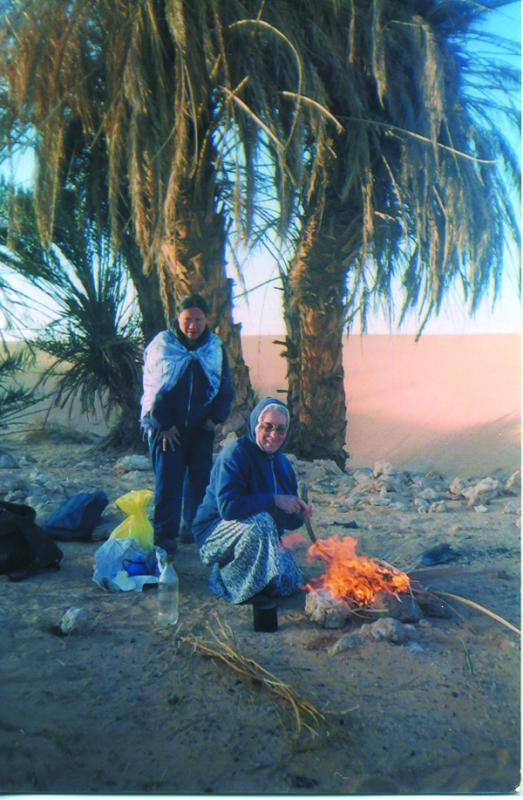
LSr Cecilia (standing)
helps prepare
Algerian tea
It was last Holy Week when LSr Askale from Ethiopia and I arrived in Béni Abbès, which has a population of 11,000 Muslims. We were only 20 Christians – six Little Sisters, three Little Brothers, seven other religious women from four different congregations, one worker-priest and three laypeople. The differences between us didn’t matter; we were simply Christians, brothers and sisters coming together to recall the passion, death and resurrection of the One who had called us and brought us together, whose gift of Love had led us to this place to give witness to that Love.
Br Charle's Chapel
How strange it felt for me, coming from a country where millions of Catholics were at the same time celebrating the same event with great pomp and devotion. Yet I loved the simplicity and bareness of the liturgy, the longer moments of recollection and silence, the spirit of unity and fraternity among us. I thought of the first Christians when they came together after the death of Jesus to remember and celebrate His gift of Love.
Just before Holy Week, the Muslims were having their big celebration of Mohammad’s birthday which is uniquely celebrated in Béni Abbès. People from other parts of Algeria came for the festivity whose main attraction is the war dance between two groups of men dressed in long white gowns and turbans and carrying rifles. They fired into the ground in between the chants that glorified Allah and honored Mohammad while the women and children watched and cheered. In the middle of the big crowd, all trying to get a glimpse of the dance, we decided to sit and simply feel the atmosphere. It felt like a fiesta. Part of me rejoiced with them and felt grateful that throughout their history of colonization, terrorism and war, they had kept this tradition that was part of their identity.
Before leaving for Béni Abbès, I prayed for an open heart to allow myself to be taught by the desert. I imagined long solitary walks there, only to be told that it was risky for a woman to go out alone. So one of the first things I learned was to be dependent on others, especially on the Little Sisters, and to trust in their experience. In the desert, one has to learn dependence and trust. I understood then that I had to keep my adventurous and independent tendency under control if I wanted to survive. The Sisters told us stories of people who got lost and died in the desert. Afraid of this, when each would look for her own quiet spot amidst the dunes we always kept the village as our reference point and stayed within sight of one another. A lesson on community life?
I learned another lesson one morning during our first trek to the dunes. Each of us tended to make our own path while struggling to climb the dunes, falling often deeply into the sand, finding it hard to catch our breath.
Little Brother Xavier, our guide, came back for us and told us: ‘Better remain in the path I’ve marked out; that way you won’t fall.’ That hit me. Weren’t the Israelites tempted many times not to follow the path marked out by God for them and how many times they fell! Isn’t it also true in our own lives?
Several times, a Little Sister accompanied us to dunes reached after an hour’s walk through a rocky wilderness. These occasional walks were too few but the desert never failed to work its magic – my heart was won over. Back home, gazing at nature from the mountains, teeming with greenery and life, always lifts my spirits. How then could a desert have a similar effect on me when it seemed barren and lifeless? The bareness, the great silence, the nothingness, the marvelous beauty of the dunes, the aloneness, the vastness, how could one not think of the Creator and one’s own nothingness? What a mystery – no wonder many saints were drawn to it.
I had a pivotal moment when we went out for a whole day. Besides water and bread, I brought with me the Bible and other books. In between readings, I climbed the highest dune near me and stayed there for as long as I could endure the blazing sun. I tried to be like the dunes – still, silent, naked, empty, open, doing nothing, simply waiting. Part of me expected God to speak to me in an earthquake or a strong heavy wind or thunder. Nothing – just total stillness.
And just when I stopped expecting anything, the Spirit touched me and tears just flowed like a spring for some time, watering my dry, weary self, inviting me to put my trust once again in the Hand of God leading me through my own desert. Somehow I was led to understand why this desire for the desert had grown in me these last few years.
After ten intense days of prayer, I joined the community’s ordinary life. I worked in Brother Charles’ garden the whole morning. In the afternoon, after adoration, the Little Sisters brought me along to visit their neighbors. They never ran out of reasons to visit or to be invited for a meal or tea – birth, circumcision, betrothal, marriage, sickness, death. A few times we were invited for a meal for no other reason than the simple, appreciative friendship between the Little Sisters and their neighbors, which touched me.
The witness of goodness that Brother Charles insisted on so much is the only thing possible between people so different from one another. And the Little Sisters don’t have a monopoly on this goodness. I was touched by the simple goodness of the people that doesn’t need an explanation but simply radiates itself. How much the goodness of one draws out goodness from the other . . . Perhaps it is this goodness that saved them during the years of terrorism.
LSr Josee brought me to the old village destroyed by the French to suppress the revolution in the 1950s. Despite that terrible experience in their struggle for independence from France when many of their people were killed, they have been so kind in welcoming the Little Sisters, most of whom are French, and even protected them during the period of terrorism. When everything else is destroyed, goodness remains.
Though we could not go out to spend a night in the desert, simply staring at the star-studded sky brought to life what Brother Charles himself wrote from Béni Abbès: The evenings are so calm, the nights so serene, this immense sky and these vast horizons dimly lit by heavenly bodies, are so peaceful as they silently sing the eternal, the infinite and the beyond; one could pass whole nights outdoors in contemplation . . .
There was a stream of visitors every day knocking at the house of the Little Sisters and that of the Little Brothers. I could imagine Brother Charles when he wrote: People knock at my door at least ten times a day . . . I have between 60 to 100 visits a day . . . I share down to my last bite of bread with any pauper, any stranger . . . receiving every human being as if he were a beloved brother . . .
The times of adoration and Eucharistic celebration in Br Charles’ chapel, the witness of the Little Sisters and the Little Brothers sharing their lives with their Muslim friends, the ‘dialogue’ of goodness, the days in the desert, the nights under the desert sky . . . I felt something like the disciples’ Emmaus experience when they said, ‘Weren’t our hearts burning within us?’Wasn’t my heart also burning when God spoke to me through all these in the silence of my heart, rekindling the fire of my ‘first love’?
I will allure her and lead her to the desert, and there I will speak to her heart. Then she will respond to me like in her youth (Hosea 2:14).
I am edified and inspired by the witness of the Little Sisters and Little Brothers I met in Béni Abbès and in Algiers. What they are living there touches something very essential in Brother Charles’ charism, the naked reality of a life totally given to God without reserve, not expecting results, not needing to prove itself by doing great things but just freely given, in fidelity till the end, to a people so different in many ways, ‘out of love, out of pure love’ (Br Charles). Maybe the nakedness of the desert has fashioned their interior life, as it did that of Brother Charles. This is what I hope for myself, too.
One has to pass through the desert and stay there in order to receive God’s grace. It is there that we empty ourselves completely . . .where all that is not of God is driven away so as to leave the place to God alone . . .
(Br Charles)
You may email the author at lsrcecilia@yahoo.com or write her at:
21 Alchan Street, Barranka Itaas, 1554 MANDALUYONG CITY.
Bend In The Road
By Gil L. Casio SM
The author, a seminarian with the Society of Mary, is stationed in Thailand, having been in Myanmar for a while. He is from Surigao.
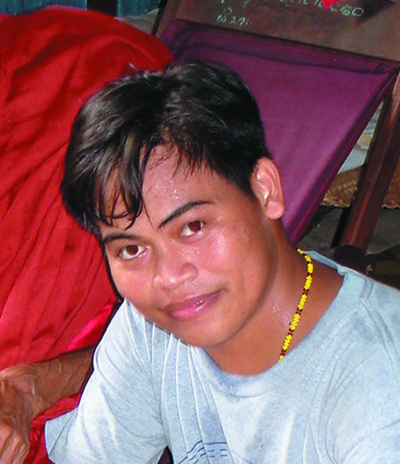 Last year, I had the privilege of joining the team of the Marist Mission Center – Australia (MMC) in visiting refugee camps in Maesot in northern Thailand. Thousands of the Karen tribe from Myanmar (formerly Burma) live there in the middle of the jungle. It was my first time to see people who were obviously suffering from injustice and oppression.
Last year, I had the privilege of joining the team of the Marist Mission Center – Australia (MMC) in visiting refugee camps in Maesot in northern Thailand. Thousands of the Karen tribe from Myanmar (formerly Burma) live there in the middle of the jungle. It was my first time to see people who were obviously suffering from injustice and oppression.
Young Karens
I stayed with young Karens in a hostel for a few weeks. They were very friendly and affectionate. They shared their experiences and how they came to the camp. Life isn’t easy for them. They are far from home and their loved ones.
Their hearts’ desire
I was moved by their words, ‘I want to change the world.’ In their hearts they are dreaming and hoping to change the world. Being with them was really an eye-opener, seeing the brokenness of the Myanmar people.
My brief experience with the young Karens was the first step, as I prepared myself to go to Myanmar, to answer the call to witness.
Mission Exposure
It is part of my formation as a Marist seminarian to have a two-year ‘Marist Mission Exposure’ overseas. I went and joined the small group of Marist missionaries – two priests and a Lay Marist – in the Kachin State in northern Myanmar, in the town of Bhamo, only a few kilometers from the border with China. Mission in this isolated place full of suspicion is difficult.
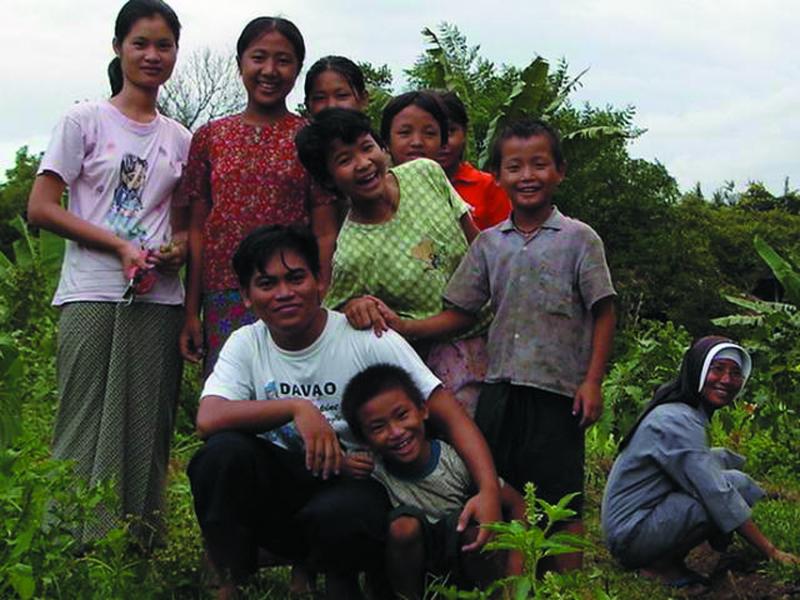
Gil with the Kachins-Burma
I started to learn Kachin, known as ‘Jinghpaw.’ It is easier to learn than Burmese, the national language. I felt so at-home with the very warm and hospitable Kachins as I began to adjust to their culture and language.
I said to myself, ‘I wish to make my home with them.’ I wanted to do something for them, especially the youth, to empower and encourage them, for they are the hope of the future for their country.
After two months, Bishop Francis Daw Tang came all the way from distant Myitkyina to inform us that our visas hadn’t been extended. We went to Yangon, the capital of Myanmar, for a few days to see if we could get an extension. Unfortunately, we were being ‘kicked-out’ due to a change in the government’s policy. Non-Government Organizations (NGOs) were also under pressure and some Protestant churches were closed down.
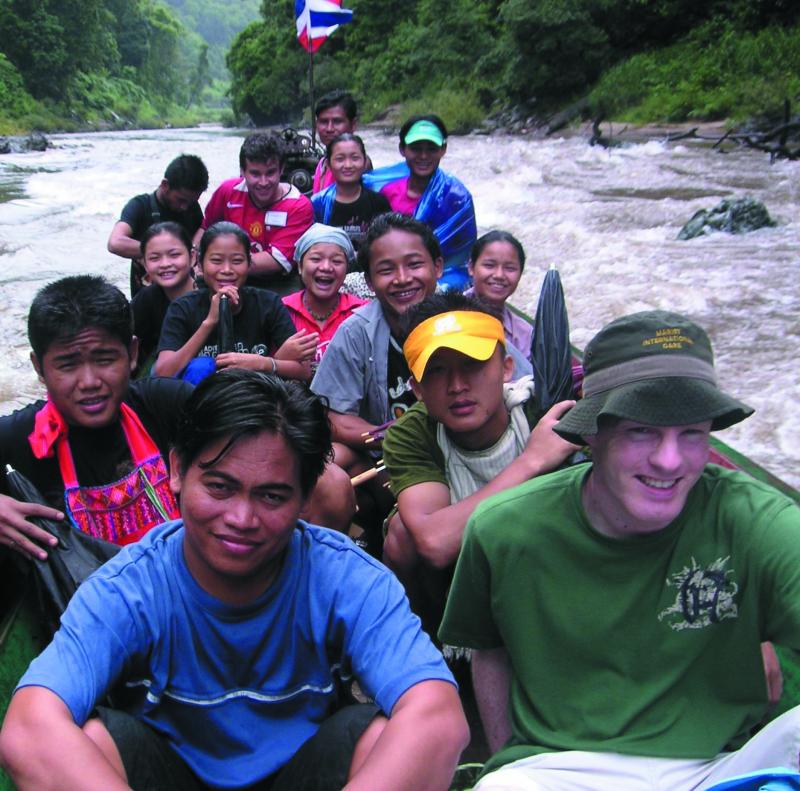
A boat ride to the neighboring camp during the Asia Pacific Development Program 2005 in Thailand
Failed mission?
The Kachin people, whom we loved, wanted us to stay. Their last sad and moving words were, ‘Bai wa rit yaw,’ ‘Please come back.’ I asked myself, ‘Was our mission to Burma a failure?’
We prayed and searched together as a community, asking the Holy Spirit where God wanted us to be. Our mission was really for the people of Myanmar. My community could speak Burmese quite well.
We flew back to Thailand, frustrated, hurt and with heavy hearts.
Possibilities
There are many people from Myanmar in Thailand, where we went from north to south searching for possibilities for mission to the Burmese. We saw that the border town of Ranong in southern Thailand had a great need. So, our two priests went to the Philippines for a meeting and a break, while our Lay Marist went back to Myanmar for the closure of our mission there.
Deeper Understanding
I stayed in Thailand and worked for a few weeks with a Maryknoll priest as a volunteer at an AIDS hospice in the Buddhist monastery in Lop Buri. My commitment to the mission deepened there.
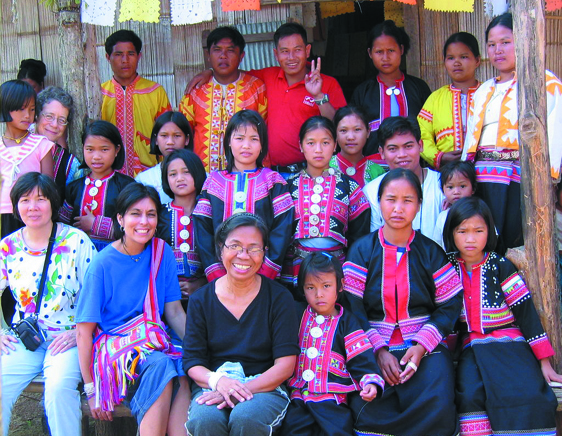
The ‘Lahu’ Hill Tribe-Chiang Mai
Love 101
I served the people in the hospice, feeding them, washing them, cleaning them and changing their diapers, assisting them to stand and walk, listening to their stories that I couldn’t understand, accompanying them as they went to worship their Buddha, washing and dressing their dead bodies in preparation for cremation. I realized how challenging being on mission is. It really demands humility. It really demands true service. It really demands LOVE.
My superior emailed me from the Philippines asking me to look for a house to be our base in Ranong. Though I couldn’t speak Thai, I said ‘Yes!’ Ranong, only 20 to 30 minutes by boat from Myanmar, is home to a large Burmese migrant population, many of whom work in fishing and related industries.
As I walked around the town, I arrived at Saphan Pla, a ‘Little Burma.’ There were Burmese everywhere and Burmese culture was very evident in the noodle and tea shops and betel-nut stands. There was loud Burmese music in the ‘videoke’ bars, men and women everywhere wearing the longyi (sarong), women coloring their faces with thanaka, a mildly fragrant bark ground into a powder, mixed with water and applied to the face in various designs.
I was alone, unable to speak either Thai or Burmese. Very few could understand English. At times I felt rejected by some Thais, as I look Burmese. People from Myanmar are discriminated against in Thailand. Thank God, there were people who generously helped me find a house. When my community arrived in Ranong, it was a great relief for me!
The mission begins
The author with his students
from Bangon school in Thailand
We decided to start our mission for the Burmese people in a quiet, simple and gentle way. We came to know them, their problems and needs. They escaped into Thailand but live as refugees and poor migrant workers. They have few options for rebuilding their lives. They are vulnerable to exploitation such as human trafficking and prostitution, hence prone to HIV-AIDS.
Our mission, my call
We, the Marists in Ranong, reflect on what the Gospel and Church response should be for the migrants from Myanmar.
We work in various ministries among them: the pastoral care, the social care, and the education of Burmese children. I focused on education and volunteered to help in some schools run by NGOs for Burmese children.
I teach English, which is demanding. I remember my first class in a school outside Ranong. Most of the children, even the older ones, couldn’t read or write. Yet, I could teach them, despite my broken Burmese, and play with them. I feel so at-home with these children whom I love. I’m not a licensed teacher but this is my contribution to the mission, to the Church.
We’ve found a greater need here. It is in witnessing that we come to know the violence and poverty experienced by the people of Myanmar. It is in witnessing that we come to know the division and prejudices among their tribes. It is in witnessing that we can offer hospitality, do something, serve them and bring hope and healing.
In the mission I experience struggles and pain. I need to be strong and courageous. Indeed, my experience in mission is an experience of God.
You may email him at
GodisLove@mail2Love.com
or gcasio@gmail.com
Centennial Of Redemptorists In The Philippines (1906-2006)
By Father Bernard Casey CSsR
On the Feast of the Epiphany 2006, the Redemptorist Congregation launched the Centennial Celebration of their presence in the Philippines, an opportunity to thank God for all He has done through their presence and to thank the people who have cooperated with them in their mission to the poor for 100 years.
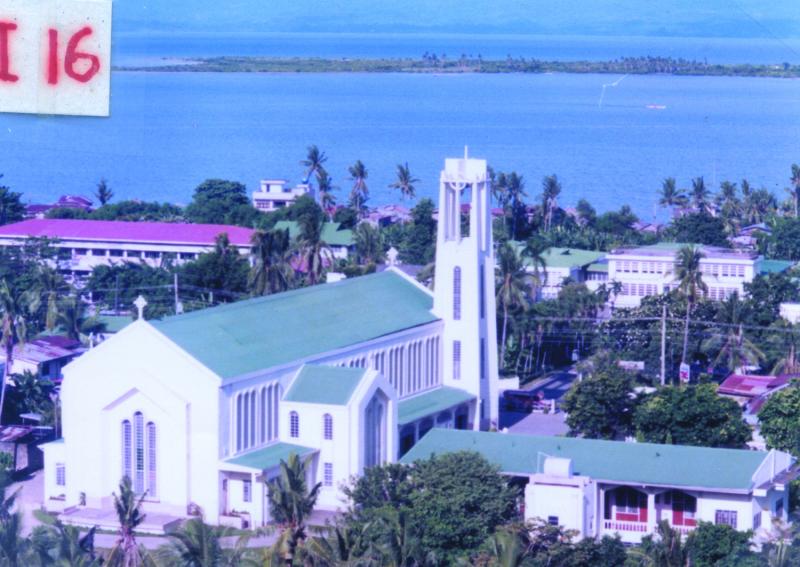
Redemptorist Church, Tacloban City
In 1991 the Second Plenary Council of the Philippines (PCP II) declared: ‘When at the turn of the century we rebelled against the sword, we did not throw off the cross.’ Ninety years or so before PCP II, Filipinos revolted against foreign domination, especially that of Spain.
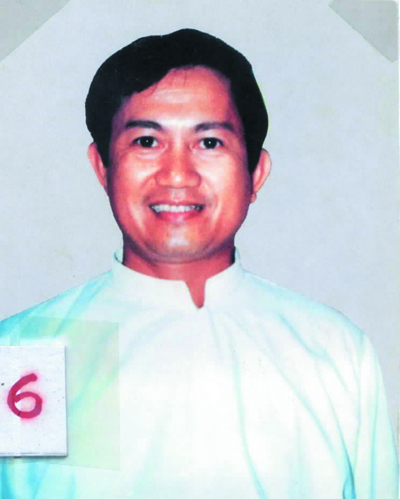
Fr Rudy Romano CSsR
abducted 11 July, 1985
in Cebu City and never seen again.
The result of this revolution was a severe shortage of priests. There were more than 1,000 Spanish friars and 700 Filipino diocesan priests in 1898, who took care of 697 parishes in the country. By 1904 only 246 friars remained. The number of diocesan priests had also decreased. Many of them joined Fr Gregorio Aglipay who later set up his own Iglesia Filipina Independiente. The spread of Aglipayanism greatly confused the people because the Aglipayans maintained many of the religious practices of the Catholic Church.
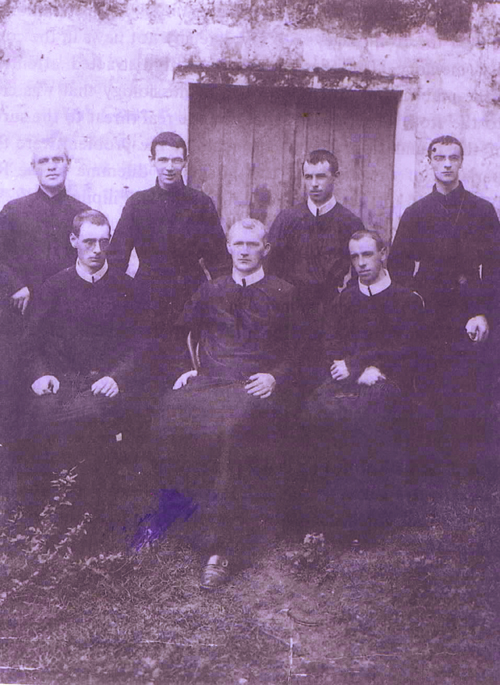
The community of Opon,
Mactan Island, Cebu, in 1907
The bishops appealed to Rome for help. A number of congregations responded, including the Redemptorists and the Mill Hill Missionaries. After a personal appeal from the Pope, the Redemptorist General Superior asked Ireland and Australia to send some missioners here. These came in 1906.
I am very happy that I’ve spent almost half of those 100 years in Panay and Negros. What keeps me here are some remarks made early in my missionary work. While on a mission in Janiuay in 1960, I returned from a four-hour house-to-house visitation and my elderly tagbalay (host) said, ‘Padre, imo obra pareho man sa obra ni Jesu-Cristo,’ ‘Your work is the same as that of Jesus Christ.’ I still find great consolation in that affirmation. Years later, the late Archbishop José Maria Cuenco of Jaro attended the closing of a Redemptorist mission and told the people: ‘The Redemptorist missionaries have revived and preserved the faith of our people in this diocese.’
That is why we are here in the Philippines – to revive and preserve the faith. Our main work according to our rule is: ‘We are Apostles of Conversion in so far as the chief object of our preaching is to lead people to a radical choice regarding their life – a decision for Christ and draw them firmly and gently to a continual and total conversion.’
We try to help people understand and accept the ‘Plentiful Redemption’ which Christ brought to the whole world by His birth, preaching, passion, death and resurrection. We will be judged on the last day on how we have done this.
There are many religious congregations in the Philippines. But as far as I know, there is none doing the work we are called to do – parish missions – going to the parishes and spending four or five days in the barangays, helping the people to understand their faith.
The Redemptorists brought the love and devotion to our Mother of Perpetual Help to this country. In 1866 Pope Pius IX entrusted this image of Our Lady to the Redemptorists with those words: ‘Make her known to the whole world!’ In 1946, an American GI from Boston visited St Clement’s, Iloilo. He was amazed that there was no Perpetual Novena to Our Mother of Perpetual Help as there was in Boston. He proposed to the Rector, Fr Patrick Nulty CSsR, that he start the novena. Now it is extraordinarily popular all over the country and in other countries where Filipinos live. Countless numbers of people have received favors from God through it.
During this Centennial Year, we thank God for all he has done and still does through the Redemptorists with the Perpetual Help of God’s Mother. We place our celebrations throughout this year in her care and pray that she will protect all who have supported us for the past 100 years of preaching ‘Plentiful Redemption in the Philippines’.
-------------------------------------------------------------------------------------------------------------
Father Peter Mulrooney CSsR, 1912-2006
By Father Seán Coyle
Father Peter Mulrooney CSsR died in Cebu on 7 September, less than a month after his 94th birthday on 18 August, almost 72 years after his profession as a Redemptorist, and 67 years after his ordination. He volunteered to be a chaplain in the British Army during World War II and served in northern Burma in the area where the Columbans worked. His experience there caused him nightmares from time to time for the rest of his life and he was also troubled by a leg-wound received there.
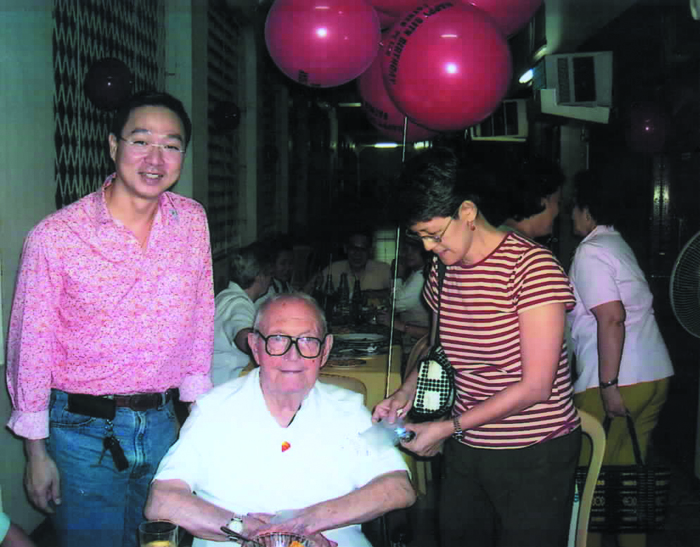
Father Peter arrived in Cebu with eight other Irish Redemptorists in August 1946 to relieve those who had suffered during the Japanese occupation. The same year the Redemptorists introduced the Perpetual Novena to the Mother of Perpetual Help. He studied Cebuano in Balamban and spent the next forty years giving missions in almost every parish in Cebu as well as in Bohol, Leyte, Negros and in many parishes in Mindanao. He was much respected and loved by the people and by the priests.
He was rector in Cebu before serving as Vice-Provincial of the Cebu Vice-Province from 1956 till 1964, after which he served a term as rector in Dumaguete. The Vice-Province became a province independent of the Irish Province in 1996, 300 years after the birth of St Alphonsus Liguori, founder of the Redemptorists.
In his latter years, when he wasn’t able to celebrate public Masses, Father Peter still served as confessor to many priests and bishops who found in him a kind and compassionate brother-priest whose commitment as a Redemptorist was a given, a source of strength to many.
A few years ago, reflecting on his life in the Philippines. Father Peter said, ‘The happiest time in the Philippines for me was the professions and ordinations of the Filipinos.’ May this faithful priest, a big man with a big heart, rest in peace.
Eighth Day
By Katie Flaherty
For seven days
she is limp as rags
and sweat damp;
our firstborn child
the color of a frog’s throat.
My own Petit Piton is burning
with dengue fever
and it’s too late
to go home now.
The kindly doctor already drove
dirt up our winding banana road
to bring the last penicillin
that didn’t work.
‘No more that medicine can do,
sister . . .’
And sweet Ivy, eh eh
cross her arms over her wide lap
and shake her head
for our poor daughter –
She, we, us,
all setting our prayer vigil
and it is too late now to go home.
The fever never breaks
never breaks and ever me
thinking of other mothers,
sisters on their dirt floors,
who lost their babies having loved them
just as fierce . . . too late . . .
After this blur of close close heat
and worry
and cocks crowing through the night,
She is cool as a fish belly at Oisten’s
better now and we wake
to Hillary and Charlie
bringing us black bananas.
Father Joeker
Gone Batty
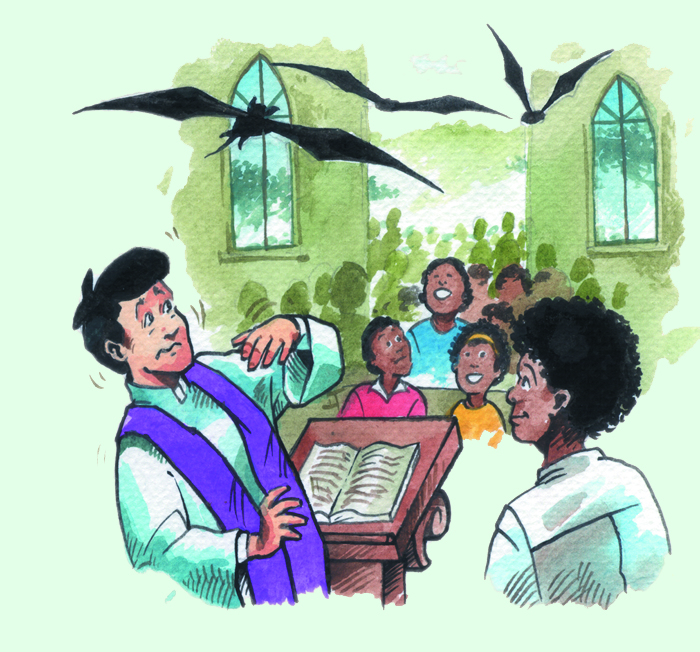
That Sunday, the gospel reading was about the cure of the demoniac. During the homily, a fearful noise was created by a flock of small bats flying from the ceiling of the church as if the roof was falling down. Looking up I screamed, ‘Those are the evil spirits running away.’ The adults and children laughed as the catechist interpreted what I said.
Closed to the Public
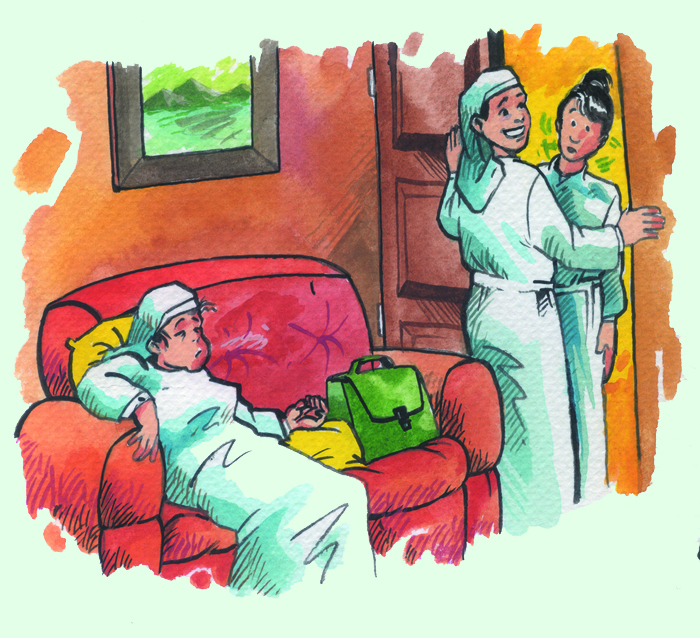
Sister Julie Salinas RVM was on home leave in the Philippines. The novices wanted to see her right away when she arrived at the convent but her Superior blocked them at the door and said, ‘Later, na lang. She’s not yet fit for viewing. She’s still undergoing “rehabilitation.”’ The Superior thought they might be discouraged to go on mission.
Mistaken Identity
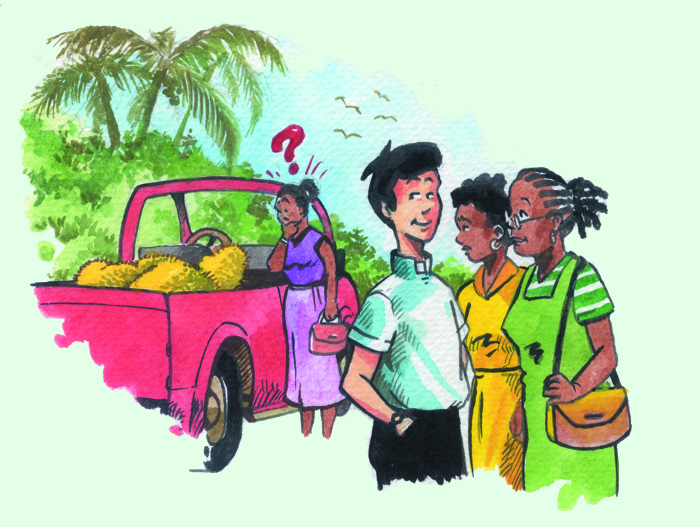
At our school, I loaded the back of the car with several big, ripe jackfruits. No one knew they were edible. The trees had been planted by the Filipino RVM Sisters. At the office of the District Education Supervisor, the teachers saw the fruits and asked, ‘Father, what kind of fruits do you have in your car? Octopus?’
Nosy Noses
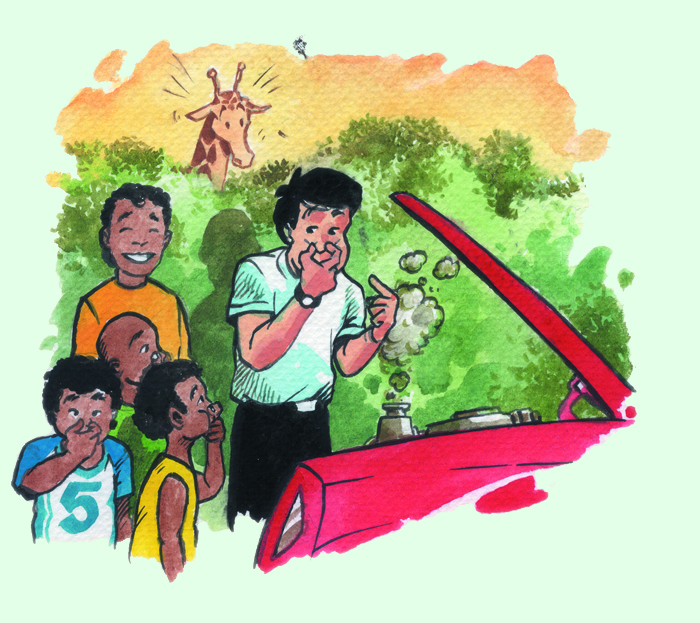
As we were repairing our radiator that kept overheating, many curious villagers crowded around peering at it with grim intensity and remarking, ‘Ah-hah...all holes?’ ‘Where did they get the idea of making holes in the radiator?’ I asked, but no one answered. ‘Try closing your nostrils and don’t let air come in and see what happens,’ I continued with everyone shrieking and laughing. Then I concluded, ‘So, as nostrils are to the nose, holes are to the radiator.’
How To Observe Lent With Your Family
By Fr Stephen Cuyos MSC
‘I consider blogs and podcasts as today’s most effective tools in sharing personal reflections and in proclaiming God’s liberating message of joy, peace and love online,’ says Father Stephen on his website, www.stephencuyos.com, where this article first appeared. From Tayud, Consolacion, Cebu, he was ordained in November 1998 as a member of the Missionaries of the Sacred Heart of Jesus (MSC), www.misacor.org, and has been Supervisor, Electronic Media Center, Communication Foundation for Asia (CFA-MA), since January 2006. He graduated Summa Cum Laude with a Master of Arts in Mass Communications (Major in Television) at Universitá Pontifica Salesiana in Rome in 2005.
The Lenten season is an ideal time to deepen the faith in your family. Deep, personal and mature faith is a necessity; that is why every family needs to work at it. It is not something that comes naturally, easily. It demands sincere commitment to make faith grow in the family and lots of hard work. The easy part of being parents is the physical creation of life. The hard part is the continuous creation of life in their children. This continuous re-creation of life includes the cultivation of a family spirituality that will help children grow up in an atmosphere of prayer and deep commitment to doing God’s will.
Allow me to offer a few suggestions on how to develop an atmosphere where faith and commitment can grow in your family this Lent. Let me also share a few points on how to make Lent a season to strengthen the closeness and intimacy in your home.
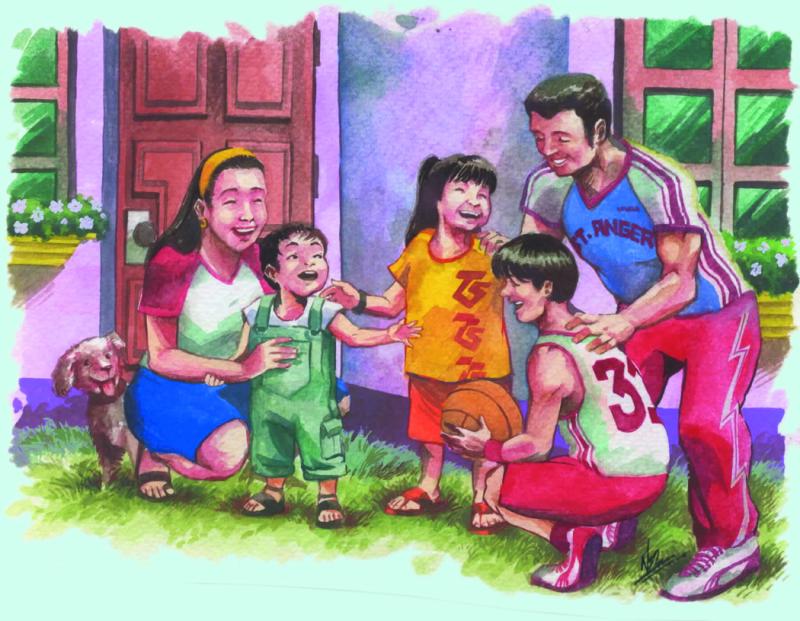
An ideal atmosphere for any family is one of togetherness and prayerfulness. One researcher asked 1500 children as to what they think makes a happy family. The results say it all. The children didn’t name money, cars, or mansions as necessary for family happiness. They all agreed that simply doing things together makes a happy family. My childhood experience confirms this – the happiest times of my life were the moments when we were all together as one happy family.
Pray together at home
As much as possible do things together with your whole family. Prepare food together, eat together, wash the dishes together, recreate together, clean the house together, study together. There is nothing more inspiring than parents and children having a good time together. By being with their children, parents can express their love without even saying it. The natural fruits of spending time together are closeness and intimacy. Not even the most expensive presents can take the place of your simple presence.
One very important thing that should be done together regularly by the whole family is PRAYER. Lent is a season of prayer and penance, thus it is an opportune time for you to gather again at your family altar and make prayer a part of your daily family life. Read the Bible and reflect on its message everyday as a family. Recite the rosary together. Say grace before and after meals together. Offer a prayer together to God before and after sleeping. Give thanks to God together before going to and after work. Lift your worries to God together. Whatever prayer you wish to offer God, just do it with the whole family. And it is the parents who should take the initiative for the whole family to spend lots of times together in prayer. For children who live their daily lives with parents who worship and adore God, will learn to worship and adore him also.
Go to Mass as a Family
The Lenten season of forty days is essentially a time to return to the Lord, to do penance for the wrongs we have committed and to undergo true conversion. Thus it presupposes a raging hunger for God and for new life in Christ. What else can satisfy our hunger for God’s intimacy and newness of life but the Holy Eucharist. For in the Eucharist we receive no less than Christ himself, who is the living bread of our spiritual life. The Catechism for Filipino Catholics states that ‘the Eucharist responds to the deepest human hungers, both personal and communal. Such are the basic human hungers for love and acceptance, understanding, purpose in life, and justice and peace’ (# 1708).
Power of the Eucharist
These basic human hungers can be easily felt in our families. Thus the Eucharist’s importance in our family life is crystal-clear. It is precisely in regularly going to Mass as a family that we can gradually find satisfaction for our need for love and acceptance, understanding, purpose in life, and justice and peace. In the Eucharist we hear Christ’s words, receive his Body (and Blood) and experience his love. What we have received from Christ in the Eucharist is something which we must also give. The challenge is to make Jesus’ words and actions our own. When his words become our own and our actions reflect a life of self-giving service, then the Eucharist becomes extremely meaningful because it has now become a bold proclamation of our commitment to Christ and of our concern for each other.
The challenge therefore for families this Lent is to live Eucharistic lives. To live Eucharistic lives is to make everything we do flow from our experience in the Eucharist. It is to transform our everyday activities and works into meaningful service of God and our neighbor. It is to constantly strive at deepening our knowledge of God and bettering our response to him. What this means is that all of the family’s undertakings, values, plans and decisions, successes and worries, joys and pains should find its source and summit in the Eucharist. In this way, all you do as family then becomes a means of expressing your total dependence on God and your gratitude for his ever-present love.
Do three loving acts each day
Do three loving acts each day this Lent – one for God, one for your family, and one for yourself. It might be as simple as massaging the head of your Papa when he has a headache or as commonplace as taking time to listen to your children or as modest as helping your manghod (younger sibling) bandage a cut or as sublime as planting a tree in your backyard. Whatever you do, make it an act of love. Love is what matters and makes all the difference. For each loving act you do you communicate loud and clear – I love you. God loves you. I care. God cares.
There are three traditional Lenten practices – almsgiving, prayer, and fasting. These could well serve as your three loving acts. Almsgiving means getting personally involved with the poor and compassionately helping them alleviate their plight. Prayer means reflecting on these questions – How’s my relationship with God? With others? How will I grow close to God during these forty days? Is there something I can’t give up which is hurting my relationship with God, with my family and friends? Are my values and priorities in proper order? Fasting is a symbolic expression of our self-offering to God and of our detachment from all the transitory material things in this world (like food) in order to become open for spiritual values and to see clearly what really counts in life. In a word, fasting means to thirst and hunger for God.
Family First
Do each loving act not for self-satisfaction but for the praise and glory of God. Imagine each of you doing at least three loving acts each day. What a happy, healthy, and holy family you’ll have. And you don’t have to do ‘great’ things in order to achieve this at home. You only have to do the ordinary ones – like encouraging your children often, praying with and for your family habitually, being honest with your children – but with extraordinary love. When Mother Teresa was awarded the Nobel Prize, she was asked, ‘What can we do to promote peace?’ She replied, ‘Go home and love your family.’
You may email Father Stephen at
stephencuyos@gmail.com
or write him at: CFA-MA,
4427 Old Sta Mesa,
PO Box SM 434 2806 MANILA
Letter From PNG
By Sister Irene C. Anapi FAS
Sister Irene is on her second term, 2006-2010, as Superior General of the Franciscan Apostolic Sisters (www.geocities.com/franapsisters). The Congregation, founded in 1953 in the then Diocese of Tuguegarao, currently has four Sisters in Papua New Guinea and members in seven communities in the USA.
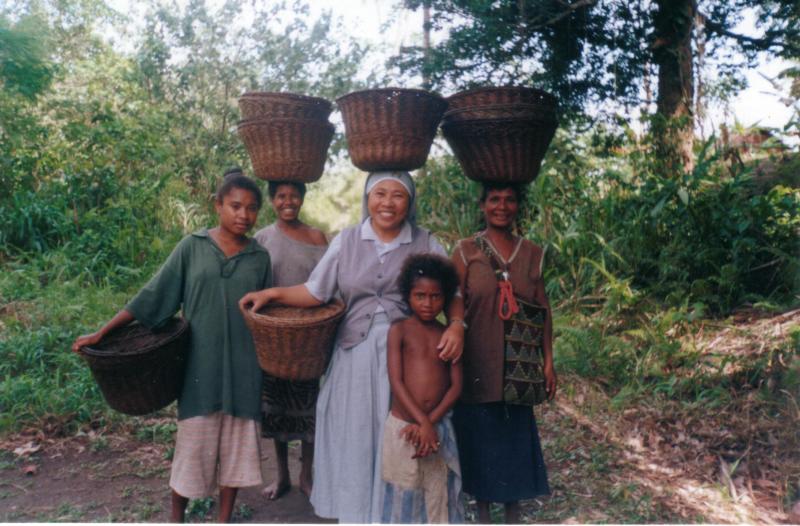
Dear Father Seán,
Greetings of Peace and every blessing! Thank you very much for reaching out to us through your valuable, informative and inspiring magazine. I am an avid reader of the different articles published in Misyon, which unites me with the lights and shadows of missionaries overseas.
We, the Franciscan Apostolic Sisters (FAS), opened our first overseas mission in the USA in 1985. Ten years later we started in Papua New Guinea, in the Nunciature in Port Moresby, for two years. We then ventured into an active apostolic mission. We sent Sister Agnes Infante and Sister Ofelia Argonza to teach in St Fidelis College, the minor seminary in Madang run by the Franciscan Capuchins, under Archbishop William Kurtz SVD, who is Polish. They teach Science, English and Theology in Grades 11 and 12 and help as liturgist and librarian.
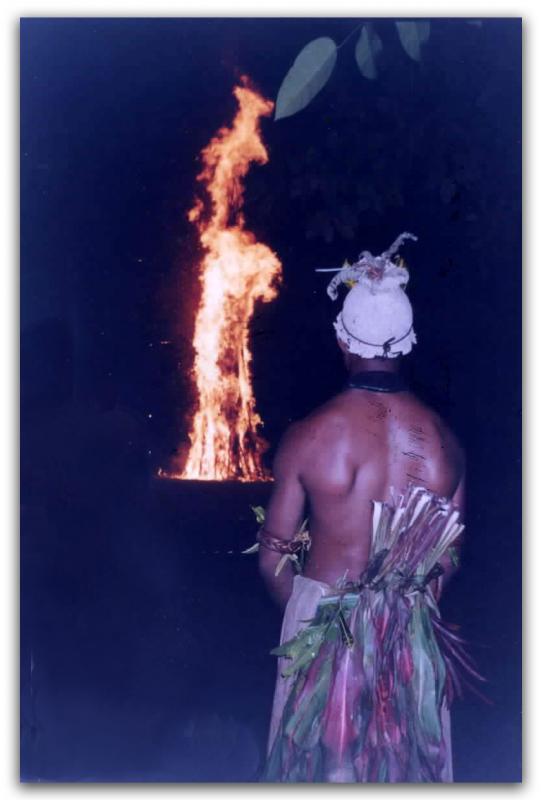
Likewise, Sister Visitacion Alejandrino and Sister Porfiria Cauilan are pastoral workers in Our Lady of the Sacred Heart Parish at Budoya, Alotau. The parish priest is Father James Moore MSC, with Bishop Francesco Panfilo SDB of Alotau-Sideia.
Getting to Budoya is quite difficult. Alotau is the capital of Milne Bay Province (milnebaytourism.gov.pg), which is comprised of 160 named islands, one of them Budoya, and 500 cays and atolls scattered over an area of 250,000 square kms. I went there on 8 April 2004, Wednesday of Holy Week, and stayed at St Fidelis seminary. I admired how the priests and seminarians integrated their culture with the Holy Week celebration from Holy Thursday to Easter Sunday and was deeply touched by their deep faith in God, expressed in various forms. For example, I had never seen a Paschal fire as beautiful and glowing as the one made by the seminarians for the Easter Vigil. They tied several tall green bamboos together to make it six meters high. They tied several layers of dried coconut leaves from top to bottom around the packed green standing bamboos. The seminarians lit it and as the dried leaves were burning they heated the green bamboos underneath. These exploded like a ton of firecrackers. The explosion caused the twigs of the burning coconut leaves to fly like fireworks which could be seen ten kilometers away. It lasted for thirty minutes and everybody just stood still to watch, pray and worship the God who is the Light of the world.
When I flew to Alotau I was unaware that the boat to Budoya sailed just once a week. So, it was already 21 April when I went there, the trip arranged by Bishop Panfilo. The ten-hour journey gave me a chance to interact with the crew and by day to watch the dolphins following the ship. At first I was scared thinking they were sharks. Nobody knew I was arriving. As soon as the boat docked the Christians living along the seashore spontaneously came out to meet whoever was arriving, the two Sisters were among them.
The Budoyans are simple people full of faith, very friendly and generous in their gesture of hospitality. They have no vehicles, no electricity and communicate with other places through letters. The priests, Missionaries of the Sacred Heart, had put up a school for basic education, a simple clinic and a small store for basic needs. Our Sisters help in the Catholic formation of the young and adults, organizing the basic ecclesial communities in the other islands. My faith and love for the mission have increased with my experiences in Madang and Budoya. We hope to send more Sisters to these mission places. As I left, I planned to visit again before long.
Respectfully yours in Christ,
Sister Irene Anapi, FAS
Superior General
Lives Of Counter-Culture
An Interview with Lay Spiritans John and Katie Flaherty
This article, reprinted with permission, first appeared in the May 2004 edition of Spiritan, the quarterly of the TransCanada Province of the Spiritans, the Congregation of the Holy Ghost, www.spiritans.com
Lay Spiritans John and Katie Flaherty were interviewed in their modest East End Toronto home. At one stage the proceedings were interrupted by a period of chaos as their children Annie, Gabriel and Locky came home from playing in the park.
Was it your common interest in Christian living, or Catholic Action as it is also called, which brought you together?
Katie: Yes, it certainly was a shared interest when we were both attending St Michael’s College in the University of Toronto. We had some classes in common as we both followed general courses, including English and Theology. We lived the typical life of undergraduates, meeting in groups in pubs and at dances and also being part of the very active Christian life which identifies St Mike’s to this day. In fact John served as Convener of Religious Affairs for a period.
John: In University each of us recognized that the other was a person of faith. Our preparations for our marriage were mainly spiritual ones. Thanks to the input and participation of our two families and our friends from University, the ceremony was faith filled. A joyful Eucharist ceremony encompassed our exchange of vows. We began our life together in Ottawa where I continued my law studies. Here we became actively involved with the soup kitchen of the Shepherds of Good Hope.
Katie: I began my teaching career in Immaculata High School where I was deeply involved in teaching dramatic arts and producing plays and musicals including Godspell and Les Misérables. The skills I learned in this position turned out to be central in my later years. The love of poetry I acquired while teaching High School has resulted in my deepest, sincerest thoughts and emotions being expressed through poetry to this day.
Suddenly I was struck down with a very severe case of spinal myelitis from which it took me months to recover. In the hospital I enjoyed an epiphany which only intensified my desire to serve overseas as a missionary. In this intense spiritual experience I was given the grace to put total trust in God. I no longer felt a need to be influenced by merely human reasons or feelings. I had absolutely no fear. I was in total peace. I knew that I was called to a life of service to the needy and oppressed.
When did you act upon this call?
Katie: When I recovered from my illness and John had completed all his legal studies we volunteered for overseas service with Volunteer International Christian Service (VICS). My brother had served in The Gambia as a VICS volunteer and we were delighted when a suitable posting was found in Saint Lucia in the Caribbean. Our parents and friends urged delay. I was still weak after my illness and Annie, our daughter, was still a baby. But we knew the time was right.
John: I ran a free legal clinic for the Archdiocese(www.archdioceseof castries.org/). This clinic served those who were too poor to afford legal fees of any sort. Katie worked in a school for the deaf, where she learned the art of teaching children who could not hear from Sr Grace Martin CND, herself a volunteer. She gave Katie the task of working with the small group of children, profoundly deaf, who had never been to school before.
Katie: Two of them in particular, Robert and Anika, will forever be in my heart and prayers. Both were abandoned children living on their wits begging for food and shelter. Neither had ever been in school. Neither had been socialized with other children. With them I had to start at the very beginning and earn their trust and affection despite the scars left by years of neglect and by their inability to hear and speak. It gives me great satisfaction to know that Robert, who can now sign and lip read, is employed as a banana picker and is able to support himself. Anika learned sign language and is nearly finished with her studies to become a teacher for the deaf.
After nearly a year and a half in St Lucia, disaster struck. Annie contracted dengue fever. As the fever took deeper and deeper hold Annie became weaker and weaker. She wasted away before our eyes. The medication was having no effect. The doctor said that she was too weak to transfer to Canada. Our new-found friends, especially Ivy, Hilary and Charlie, rallied around us in constant support. John and I bonded with this group of St Lucians as we had never bonded with friends before, as they kept vigil with us by day and by night. When we began to realize that we might lose our firstborn, our little angel, Annie’s fever broke. The prayers of the poor, the deaf and two frantic Canadians had been heard in Heaven. Life could never be the same again.
Each of you have jobs, you John as a public prosecutor, you Katie as an elementary teacher. You are bringing up three children. Where does your vocation as Lay Spiritan enter your lives?
John: It inspires us and guides us in every aspect of our lives. As a family of five we try to live counter-cultural lives. We live in modest accommodation and have Tina our Ugandan refugee friend living with us. Our home is TV-free and the children have no video games etc. We live as a household of faith, filtering out where possible elements of the life outside the home which are contrary to the model Jesus lived and taught. We stress prayer, meals, communication. We treat each other and the children with dignity and respect. We teach them the responsibility which comes with their many talents. We hold family discussions. Having a refugee living with us is a challenging and rewarding experience.
Sunday liturgies are important for us as a family especially when we gather with the other local Lay Spiritans and their families for our monthly Mass. The children of the group have formed a natural community and they love to participate in the liturgical action.
Not that everything is plain sailing. Katie and I suffer the agonies and enjoy the ecstasies which parenting brings. And as our children reach adolescence we know that there will be some difficult times ahead.
For instance Locky, now five years old, has been invited this weekend to a ‘laser gun’ birthday party; a glorified war game. We refused to allow him to participate. It will take a lot of prayer and communication to explain decisions like this to Locky when he is fifteen.
Katie: I job share with Angela Carroll as Grade 2 teacher in St John’s elementary school in Toronto. As well as dealing with the secular curriculum, we prepare our students for the reception of their First Communion. It is delightful to speak of the love of God to children who are so innocent. ‘Trailing clouds of glory, have they come from God, who is their home.’ And yet it is at this tender age that we broach the topic of bullying which often begins to manifest itself in six and seven-year-olds.
I also spend a lot of time working in the Hannon-Shields Centre for Leadership and Peace. Since my background is drama, I am very involved in the Centre’s Peace Theatre (www.childrenspeacetheatre.org) and its summer peace camp where theater, poetry, dance and song teach and express a philosophy of conciliation, communication and non-violence.
John: As a prosecutor in the courts involving domestic abuse, I try to ensure that all involved, victims and aggressors, are treated with justice and compassion. I work towards reconciliation and forgiveness rather than conviction and punishment, although these will often be necessary. I stress that violence is always destructive, that the only road to happiness and growth is a culture of peace. The court system is designed to be fair, just and respectful of the accused. And I believe that even one person can make a difference.
Katie: So do I. In a culture of aggression, conflict and war, all my effort, in the home, school and the Peace Centre, is to provide an example of compassionate leadership. Working towards establishing and living a culture of peace is at the centre of my spiritual life, my family life, my life of service to others. In its deepest form it finds expression in my poetry. And for John and me, much of our prayer takes the form of wiping noses, hugging, listening, respecting those whom Jesus served and called ‘the poor.’ The children, the handicapped, the oppressed, the victims, these are our vineyard.
And in this, the spirit of Des Places and Libermann, the Spiritan charism, lives on.
Was it your common interest in Christian living, or Catholic Action as it is also called, which brought you together?
Katie: Yes, it certainly was a shared interest when we were both attending St Michael’s College in the University of Toronto. We had some classes in common as we both followed general courses, including English and Theology. We lived the typical life of undergraduates, meeting in groups in pubs and at dances and also being part of the very active Christian life which identifies St Mike’s to this day. In fact John served as Convener of Religious Affairs for a period.
John: In University each of us recognized that the other was a person of faith. Our preparations for our marriage were mainly spiritual ones. Thanks to the input and participation of our two families and our friends from University, the ceremony was faith filled. A joyful Eucharist ceremony encompassed our exchange of vows. We began our life together in Ottawa where I continued my law studies. Here we became actively involved with the soup kitchen of the Shepherds of Good Hope.
Katie: I began my teaching career in Immaculata High School where I was deeply involved in teaching dramatic arts and producing plays and musicals including Godspell and Les Misérables. The skills I learned in this position turned out to be central in my later years. The love of poetry I acquired while teaching High School has resulted in my deepest, sincerest thoughts and emotions being expressed through poetry to this day.
Suddenly I was struck down with a very severe case of spinal myelitis from which it took me months to recover. In the hospital I enjoyed an epiphany which only intensified my desire to serve overseas as a missionary. In this intense spiritual experience I was given the grace to put total trust in God. I no longer felt a need to be influenced by merely human reasons or feelings. I had absolutely no fear. I was in total peace. I knew that I was called to a life of service to the needy and oppressed.
When did you act upon this call?
Katie: When I recovered from my illness and John had completed all his legal studies we volunteered for overseas service with Volunteer International Christian Service (VICS). My brother had served in The Gambia as a VICS volunteer and we were delighted when a suitable posting was found in Saint Lucia in the Caribbean. Our parents and friends urged delay. I was still weak after my illness and Annie, our daughter, was still a baby. But we knew the time was right.
John: I ran a free legal clinic for the Archdiocese(www.archdioceseof castries.org/). This clinic served those who were too poor to afford legal fees of any sort. Katie worked in a school for the deaf, where she learned the art of teaching children who could not hear from Sr Grace Martin CND, herself a volunteer. She gave Katie the task of working with the small group of children, profoundly deaf, who had never been to school before.
Katie: Two of them in particular, Robert and Anika, will forever be in my heart and prayers. Both were abandoned children living on their wits begging for food and shelter. Neither had ever been in school. Neither had been socialized with other children. With them I had to start at the very beginning and earn their trust and affection despite the scars left by years of neglect and by their inability to hear and speak. It gives me great satisfaction to know that Robert, who can now sign and lip read, is employed as a banana picker and is able to support himself. Anika learned sign language and is nearly finished with her studies to become a teacher for the deaf.
After nearly a year and a half in St Lucia, disaster struck. Annie contracted dengue fever. As the fever took deeper and deeper hold Annie became weaker and weaker. She wasted away before our eyes. The medication was having no effect. The doctor said that she was too weak to transfer to Canada. Our new-found friends, especially Ivy, Hilary and Charlie, rallied around us in constant support. John and I bonded with this group of St Lucians as we had never bonded with friends before, as they kept vigil with us by day and by night. When we began to realize that we might lose our firstborn, our little angel, Annie’s fever broke. The prayers of the poor, the deaf and two frantic Canadians had been heard in Heaven. Life could never be the same again.
Each of you have jobs, you John as a public prosecutor, you Katie as an elementary teacher. You are bringing up three children. Where does your vocation as Lay Spiritan enter your lives?
John: It inspires us and guides us in every aspect of our lives. As a family of five we try to live counter-cultural lives. We live in modest accommodation and have Tina our Ugandan refugee friend living with us. Our home is TV-free and the children have no video games etc. We live as a household of faith, filtering out where possible elements of the life outside the home which are contrary to the model Jesus lived and taught. We stress prayer, meals, communication. We treat each other and the children with dignity and respect. We teach them the responsibility which comes with their many talents. We hold family discussions. Having a refugee living with us is a challenging and rewarding experience.
Sunday liturgies are important for us as a family especially when we gather with the other local Lay Spiritans and their families for our monthly Mass. The children of the group have formed a natural community and they love to participate in the liturgical action.
Not that everything is plain sailing. Katie and I suffer the agonies and enjoy the ecstasies which parenting brings. And as our children reach adolescence we know that there will be some difficult times ahead.
For instance Locky, now five years old, has been invited this weekend to a ‘laser gun’ birthday party; a glorified war game. We refused to allow him to participate. It will take a lot of prayer and communication to explain decisions like this to Locky when he is fifteen.
Katie: I job share with Angela Carroll as Grade 2 teacher in St John’s elementary school in Toronto. As well as dealing with the secular curriculum, we prepare our students for the reception of their First Communion. It is delightful to speak of the love of God to children who are so innocent. ‘Trailing clouds of glory, have they come from God, who is their home.’ And yet it is at this tender age that we broach the topic of bullying which often begins to manifest itself in six and seven-year-olds.
I also spend a lot of time working in the Hannon-Shields Centre for Leadership and Peace. Since my background is drama, I am very involved in the Centre’s Peace Theatre (www.childrenspeacetheatre.org) and its summer peace camp where theater, poetry, dance and song teach and express a philosophy of conciliation, communication and non-violence.
John: As a prosecutor in the courts involving domestic abuse, I try to ensure that all involved, victims and aggressors, are treated with justice and compassion. I work towards reconciliation and forgiveness rather than conviction and punishment, although these will often be necessary. I stress that violence is always destructive, that the only road to happiness and growth is a culture of peace. The court system is designed to be fair, just and respectful of the accused. And I believe that even one person can make a difference.
Katie: So do I. In a culture of aggression, conflict and war, all my effort, in the home, school and the Peace Centre, is to provide an example of compassionate leadership. Working towards establishing and living a culture of peace is at the centre of my spiritual life, my family life, my life of service to others. In its deepest form it finds expression in my poetry. And for John and me, much of our prayer takes the form of wiping noses, hugging, listening, respecting those whom Jesus served and called ‘the poor.’ The children, the handicapped, the oppressed, the victims, these are our vineyard.
And in this, the spirit of Des Places and Libermann, the Spiritan charism, lives on.
[Editor’s note: Claude-Francois Poullart des Places founded the Congregation of the Holy Ghost and of the Immaculate Heart of Mary in France on Pentecost Sunday 1703. The Venerable Francis Mary Libermann founded the Society of the Immaculate Heart of Mary there in 1842. In 1848 they amalgamated].
Some months after this interview, Katie was diagnosed as having Multiple Sclerosis (MS). You can read at www.mssociety.ca/chapters/toronto/july-aug05.htm how the family has been coping with this. You may write John and Katie c/o Spiritans, Laval House, 121 Victoria Park Ave, TORONTO, Ontario, CANADA M4E 3S2
New Year In February
By Mitzi Ramos
May Fernandez dropped by our editorial office in Bacolod City, where she’s from, before returning to Taiwan for her second three-year term as a Columban lay missionary. Among other things, she shared with Mitzi Ramos how reading Misyon led her to where she is now.
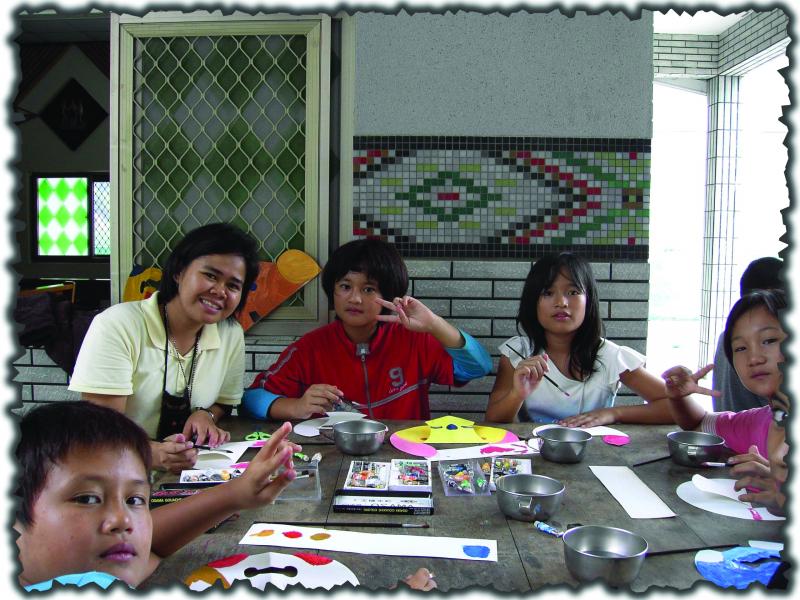
The author with some of her Taiwanese students
Is it possible to celebrate the New Year in February, the month after January, the accepted beginning of the year? If you are following the lunar calendar, it is possible. More importantly though is the question, how does one cope with celebrating the holidays away from one’s family and Filipino practices of welcoming the New Year? A Columban lay missionary to Taiwan, May Fernandez, shares her New Year moments in the mission field.
Beginnings of a journey
The seed of her missionary vocation was planted at a young age. She was exposed to mission work through the articles in Misyon, a publication her high school regularly subscribed to. Even after high school, May kept her copies of Misyon and would leaf through them once in a while, finding inspiration in the lives of the missionaries featured.
She entertained thoughts of entering a religious congregation but after passing the Licensure Examination for Teachers (LET) and teaching in her alma mater for a year, she discerned that the Lord might be calling her in a different direction. Looking through her past issues of Misyon, May decided to write to Father Pat O’Donovan, the Columban Vocation Director at that time. She was referred to the Columban Lay Mission Program. After completing the requirements, May was accepted and began the intensive nine-month training to prepare for mission work. She felt both excited and challenged. What could God have in store for her?
Marching orders
May’s dream mission field was Africa but there were no Columban missions there. She was to be sent to Pakistan until the war in Afghanistan broke out. Circumstances directed her steps towards Taiwan instead.
Her journey though was far from smooth. First, she had to leave a month after her three other companions had already left because of difficulties with her visa. She had to deal with distrust as a result of some Filipinos using mission work as a means of leaving the country and eventually working abroad. Second, it was her first time to travel alone and this was at the peak of the SARS scare. Through it all, May persevered, believing that God wanted her in Taiwan.
Working in the Vineyard
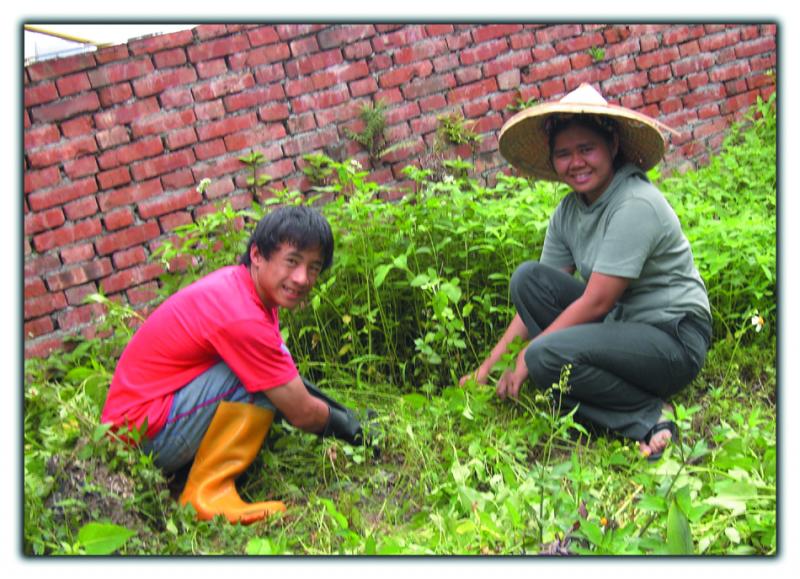
Caring for the environment
Arriving in Taiwan, May began her mission. She taught the children of the indigenous tribes in Taiwan about the Catholic Faith. She and her companions also visited old people, mostly women, bringing them Holy Communion every week. May remembers vividly one old lady, Yaki (meaning ‘grandmother’ in Atayal, the language of the indigenous people of Taiwan) whom she would visit. Yaki was blind, living alone in a house that leaked and was the only Catholic in her entire village, since the others had already converted to other Christian denominations or were Buddhist. Despite being a minority, Yaki continued to practice her faith even though all she knew was the basic prayers in her own language.
During one visit by May and her companions, Yaki prayed for them, for their safety in traveling the slippery roads that brought them to the village. This incident touched May deeply. Instead of her offering comfort, she instead was the recipient of it. Yaki’s prayers for them reminded her that though she may be far from home, through this sister in Christ, she was not alone.
Celebrating far from home
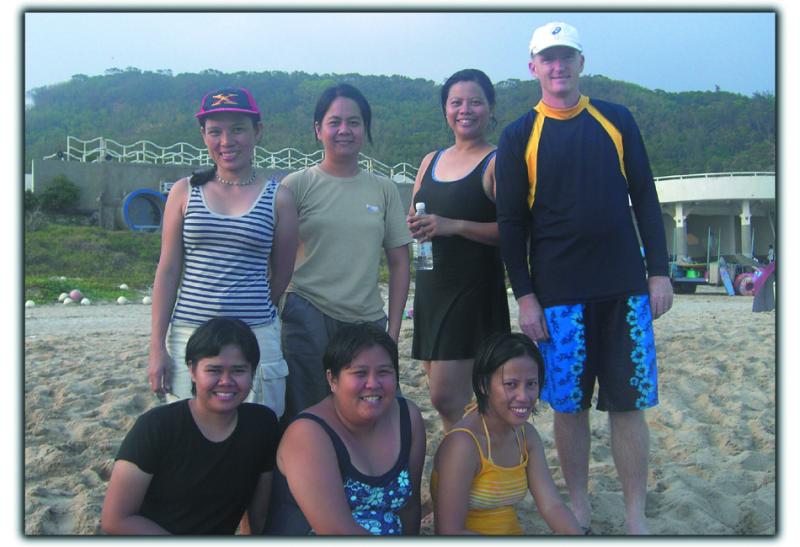
May with fellow
Columban lay missionaries
for some needed recreation
Loneliness is a constant feeling May and other missionaries had to deal with being far from home. Holidays tend to increase this emotion. Celebrating Christmas is one example. May had been looking forward to Christmas but was disappointed to discover that Christmas in Taiwan tended to be commercialized, in contrast to the way it’s celebrated in the Philippines. Being able to call home to family and friends once or twice a month only compounded the feeling. So they tended to celebrate the Lunar New Year by exploring the city instead of staying home, thinking of their loved ones.
Experience of God
Despite these challenges, May and her companions learned to find comfort in their experiences of God’s presence in their lives through the people they ministered to and in the circumstances that surrounded them. She learned to appreciate the deep reverence of the Taiwanese for their ancestors, as they pray to them and thus preserve close family ties both with the living and those who have gone ahead.
Lessons for the New Year
After having experienced three New Years in Taiwan, May has three lessons she wishes to share. First, she has learned to be open to everything, to all kinds of experiences, seeing in each one an opportunity to grow in her love of God and neighbor. By being open, the second lesson she learned was the truth that there is always a grain of goodness in each person. Thus, we have no right to pass judgment on others no matter how difficult that may be because circumstances change, and people have the capacity to change as well. Lastly, gleaning from her encounter with Yaki, May has learned that mission is not one-way, the missionary alone being the giver. It is a two-way path, the missionary giving and at the same time needing to learn how to receive. God has already been there even before any missionary. Therefore, those who may mostly receive are also quite capable of giving us a measure of God’s love.
You may reach May Fernandez through mayfer530@yahoo.com or send your letters to San Columbano, PO Box 328, HSINCHU 3009, TAIWAN
Our Hideaway

A venue for the youth to express themselves and to share with our readers their mind, their heart and their soul. We are inviting you – students and young professionals – to drop by Our Hideaway and let us know how you are doing.
IDLE THOUGHTS PAST AN ASH-HEAVEN MORNING
By Christopher Ong
Someone once told me that dreams are ad infinitum. So here I am, sixteen and surveying the vast and wide landscapes of my dreams.
One time, somebody got angry with me and told me I was a person who could never change. I agree. I never changed my dreams, my principles, my point of view. Many times I vowed to improve, but how improved can a person really be?
Journey to myself

As for being open-minded, I can’t say that I have totally graduated from my crude beliefs. I know that I can’t change my ways overnight — that would be senseless and a job for Superman. But I try to act holier, live fuller, to have a little more hope, a little more love and a little more care attending to something nobody took for anything.
Sometimes I can be misunderstood for going too far, sensing Him in the details but it’s in these little details that I often hear God’s voice. I knew God guided me to the light. Between college and my innocent younger days, at times I was lost and there were leaps of faith.
A still small voice
If you think then that the noise is an eardrum-buster, consider silence. Deafening, isn’t it? God’s voice sometimes, maybe most times, gets swallowed, nay, swatted, by people’s own callings. We have come to terms with accepting the big bang, the quantum leap, and have thus perceived them in limitless arrays. So who would bother with such minute things? For people busy with the daily and monotonous scheme of things, they couldn’t care less. I myself have also been a little indifferent. We are shocked whenever we see a thing or two out of place. But what if it’s God that’s working, reaching out to us?
‘Oh Lord, I leave my past to your mercy, my present to your care, and my future to your Love.’ With these lines, I felt God in my heart. I realized that I just need to take a step back and listen. I have to quit playing deaf and blind, and take myself for who I really am.
Then there was Me
It’s pretty amazing, the way God works. I attend Mass and will always do. I also read the Bible and I learn so many things. I could sit down and share it with others and get rewarded by their own experiences since it is clearly through experience that we come in full circle.
Truly, I’m not a hero. I’m just another player in the crowd. Well, at least I’ve collected some truths and understood some of them. Nobody will ever remember the day when I became a thinker. Everyone has something to say and among those who have told their story to their friends, my own remains untold. All seats beside me were taken by emptiness. Yet, I do have my point. In the end, that alone speaks volumes.
You may contact Christopher at toffyboy232001@yahoo.com
Send us your story (500 to 1,000 words) to PO Box 588, 6100 Bacolod City
or email it to us at editor@misyononline.com Don’t forget your picture. It makes the difference.
Pope Benedict XVI On Family Prayer
On 10 September Pope Benedict XVI spoke in Munich Cathedral to first communicants, their parents and catechists. The points he made are similar to those of Father Stephen Cuyos.
Among other things the Holy Father said that Communion is the ‘source of life’ through which Jesus ‘comes to us and makes each of us one with him.’ He then said to the children’s parents, ‘I ask you to help your children to grow in faith. I ask you to accompany them on their journey toward Holy Communion.’ He added that the children must be helped ‘on their journey toward Jesus and with Jesus.’ He then implored the parents, ‘Please, go with your children to Church and take part in the Sunday Eucharistic celebration! You will see this is not time lost; rather, it is the very thing that can keep your family truly united and centered. Sunday becomes more beautiful, the whole week becomes more beautiful, when you go to Sunday Mass together.’
‘And please,’ Benedict XVI urged, ‘pray together at home too: at meals and before going to bed. Prayer does not only bring us nearer to God but also nearer to one another. It is a powerful source of peace and joy. Family life becomes more joyful and expansive whenever God is there and his closeness is experienced in prayer.’
Based on a report from www.zenit.org
The Spirit Of Our Ministry
By Fr Raymond Ugwu CSSp
In the past, missionaries to the Philippines were nearly all Westerners. That has changed. Here a young Nigerian priest tells us of his experience in Mindanao. This article, reprinted with permission, first appeared in the May 2006 edition of Spiritan, the quarterly of the TransCanada Province of the Spiritans, the Congregation of the Holy Ghost, www.spiritans.com
The author with some of his companions in the youth ministry
My desire to ‘go teach all nations’ was re-affirmed when news of the first group of Spiritans in the Philippines came to us in the seminary in Nigeria: they built nipa huts and churches, and made ways where there seemed to be none. This touched my adventurous spirit and evoked in me a desire for the Philippine mission. When the time came for me to apply for my first appointment, without hesitation I chose the Philippines because of the new Spiritan focus on Asia, the internationality of the group, their contribution to the diocesan seminary, their move to begin a formation program, their ministries to the sick, the imprisoned, the youth, the Filipino-Chinese and the mountainous people of Digkilaan and environs.
Without much preparation about the people and their cultures, I arrived in the Philippines on 10 September 2004, exactly two months after my ordination on 10 July. My first night brought me face to face with a new language, new food, new culture, people and customs. The following Sunday we went to the Maryknoll Language School, Davao City, where I was to spend six months learning the Cebuano language, which is widely spoken in Mindanao. During my time there, I spent three months in a Chinese-Filipino Parish, in Barrio Obrero, Davao City. I also had a week’s language practice in Calidngan parish in Carcar, Cebu. These exposures made me appreciate the people’s way of living, thinking, culture and civilization. It also equipped me to face the ongoing tension I felt because of the way they practiced their Christianity and what I was used to at home.
After five weeks’ exposure to Filipino families and Basic Ecclesial Communities in Cebu, I finally came home to Iligan, where the Spiritan mission is. Here I am chaplain of two colleges: The Lyceum of Iligan Foundation, with only a college department, and Iligan Capitol College, with elementary, high school and college departments. My work includes a monthly celebration of the Eucharist, spiritual direction, organizing recollections and retreats for the students.
Teaching ministry
One day, the rector of the college seminary asked me, ‘Are you ready to teach here?’ I agreed at once because my desire was to contribute to the intellectual, moral and spiritual formation of students searching for happiness, knowledge, truth, and meaning in life. So I teach a variety of courses to the young men training for the priesthood.
Though teaching isn’t easy, it offers me joy, an opportunity to study and reflect, and to serve God and humanity. Due to our different cultural backgrounds, and because of some institutionalized academic standards, the students and I struggle to understand each other’s way of life, language, principles and ethics. These obstacles teach professors and pupils to accept the setbacks, frustrations and objective discipline found in any formation process.
When not teaching in the seminary, I am available to replace my Spiritan brothers if they have to be absent from their mission. Being a ‘Mobile Pari’ has helped me gain experience of many types of ministry.
Hospital ministry
For more than two months, I was the acting chaplain of Mercy Community Hospital run by the Mercy Sisters. There, we administer the sacraments to the sick and those who take care of them, bringing Christ to them on their sick beds, giving them hope, comfort and strength to share in Christ’s sufferings, and helping them to understand suffering as a mystery and to bear their pain bravely. At the same time we minister to the spiritual needs of the doctors, Sisters and other staff dedicated to helping the sick in their struggle for life, and against sickness and death.
Youth ministry
Working with the young is a ministry that keeps you always youthful, current with the times, alive and active. It leaves you with an ever exciting experience of growing up. For four months in 2005 and since February 2006, I served as chaplain in the Catholic Center Campus Ministry run by Sisters of the Company of Mary. It is a center for students from different colleges who come for spiritual enrichment. This ministry keeps me working and thinking about the welfare of students, how to liberate them from all vulnerable and dangerous exposure, and how to bridge the age-old gap in communal living caused by years of religious suspicion between Muslims and Christians.
The challenge of this work is the constant struggle to understand the day-to-day life, language, interest, signs and symbols of the youth. How do I penetrate the youth circle, articulate and understand their problems, inner fears, shyness, loneliness, old hurts, and feelings of inadequacy, awkwardness and love? How do I open up new possibilities for them to understand themselves, to encounter new depths in life, and gain their support and trust? In my homilies, retreats and boarding house meetings, as well as in social gatherings, I try to address these concerns.
Prison ministry
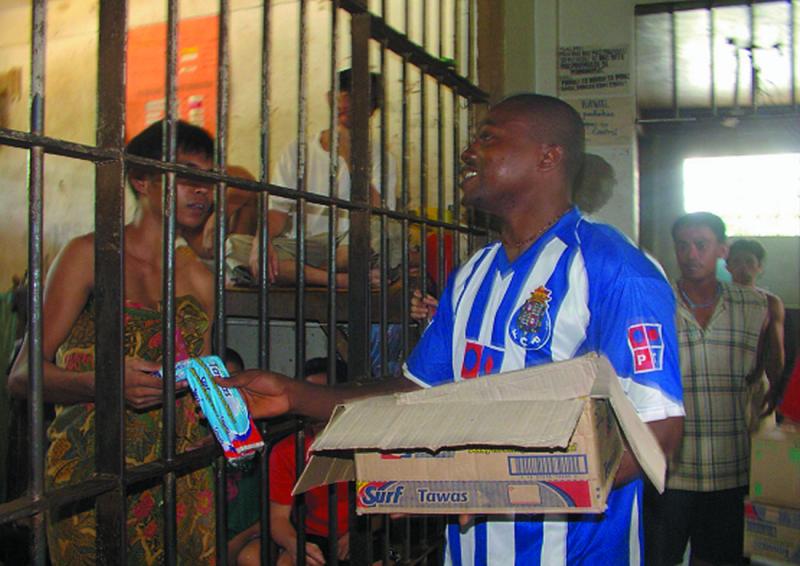
Serving in the prison ministry
Another ministry I have been doing in Iligan is visiting prisoners. It has helped me to realize the plight of prisoners and their families, to see the prison community as a community of God’s children and it pulled me away from an initial ‘I don’t want to get involved’ attitude. From September 2005 to January 2006, as the acting chaplain of Iligan City Jail, I became a prisoner, not in chains, but in ministerial association with prisoners, prison staff, prison volunteers and prison dependents. Together we formed the prison society which participates in the suffering of the inmates. Hence, I thought like a prisoner, thought for the prisoners, acted like a prisoner and worked with the prisoners and prison associates.
However, accepting this ministry was not so easy when my mind was set on the fact that prisoners are receiving due punishment for the offences they’ve committed, and so don’t merit protection and care. But daily encounters with them and listening to their stories have given me a new understanding of who a prisoner is – someone who deserves mercy, concern, kindness and protection.
In Iligan City Jail, the living conditions are dreadful, yet with different activities like games, talent shows, songs and dances, catechism classes and the celebration of Mass, we keep ourselves busy, alive and happy. The challenge in this ministry is getting volunteers and financial support to take care of the prisoners in their sub-human living conditions, the slow judicial process and rehabilitation of the ex-convicts.
Parish ministry
In Iligan, the Spiritans take care of two parishes, one in the mountains and the other in the city, and for six separate weekends, I supplied in the absence of their pastors. The one in the mountains is a mission of primary evangelization. There, the parishioners are poor tenants taking care of the rice fields, banana and coconut plantations of their landowners. The parish of Our Lady of Fatima, Digkilaan, is made up of 32 barrios divided by mountains and streams. I call my first experience there my ‘missionary baptism of fire and the Holy Spirit.’ I had to be driven for forty minutes and hike for another fifty to reach the people. The weekly collection is about P250 and the basic necessities of life can’t be easily found. I sometimes end up spending P500 or more helping the needy, the sick and the financially pressed.
The Resurrection of the Lord, Del Carmen, is a city parish for the Filipino-Chinese in Iligan. It helps to bond them and to uphold their Chinese spirituality and heritage in line with the gospel message as adopted by the Philippine church. Ministering to a community like this opened me up to another cultural world-view and way of life.
To call me a ‘rolling stone which gathers no moss’ might be a name befitting such a ‘mobile pari’ as myself. My eighteen months’ contribution to the Spiritan mission and presence in Iligan has been a fruitful and enriching experience with ever unfolding joy, inspiring me with zeal only more. Thanks to this ‘missionary availability’, the propelling force of our ministry, and my confreres who have always inspired, encouraged, supported, motivated, and challenged me to forge ahead in this evangelical mission of God in the Philippines, I look forward to many fruitful years in this small corner of the Lord’s vineyard.
You may email Father Raymond at his community’s email address: spiritansphilippines@yahoo.com or write him at: Spiritans, c/o Luga-it Post Office, LUGA-IT, 9025 Misamis Oriental.
Your Turn

Janet wrote this letter during her third year in high school
in St Catherine’s College, Carcar, Cebu.
Dear Father Seán,
Greetings in Jesus, Mary and Joseph! First, I would like to introduce myself. I’m Janet Escoba, a third year student of St Catherine’s College in Carcar, Cebu, Philippines. I have two volumes of your Misyonmagazine. Whenever I receive your magazine I am amazed by the articles especially the youth page, ‘Our Hideaway.’ This page reflects me. I too had many problems even in my younger years. One was when I had an accident when I was in Grade 5.
Before the accident I was with friends practicing badminton in preparation for an upcoming tournament. I was a good player. The day before the tournament, I went out with my friends. Unfortunately the car we were riding in had a faulty break and we hit another car.
The next thing I knew, I woke up lying in the hospital, my whole body aching. The first thought I had was the tournament. I forced myself to try to stand up but found I couldn’t. I couldn’t even move my legs. I cried and cried. I couldn’t accept the fact that my leg was broken and would take four months or longer to recover. I felt hopeless, pitying myself and blaming myself for what had happened. I felt one of my dreams shatter, the dream of being a famous badminton player. As the days progressed, I felt even more hopeless. I didn’t talk to people and was ‘hard-hearted.’ I didn’t want to see my therapist anymore. All I could think of was that God was unfair.
One day I decided to go out of our house to go for a stroll in my wheelchair. I found myself going towards a place so familiar to me, the badminton court where I used to play. There I saw my coach and my co-players practicing. I watched them seriously with envy then I started to cry. They saw me crying and approached me. They let me play even while I was in my wheelchair. At that moment, my life changed. It seemed as if a new light shone.
I went again to my therapist and now I am fully recovered from that accident, and I’m again capable of playing badminton.
I guess it’s one of God’s plans for me. That event brought me closer to God and to know Him more. Thank you for the time in reading my letter. More power and God bless!
Sincerely,
Janet Escoba
‘Epiphanies Of The Lord’ In My Daily Life
Here we publish the second part of a three-part reflection by a ‘Pink Sister’ who prefers to be known to our readers as ‘A Hidden Pearl.’ The official name of the congregation is ‘Sister Servants of the Holy Spirit of Perpetual Adoration.’ There are Filipino Sisters on mission in Argentina, Brazil, Indonesia and Togo in addition to Sisters in Germany, the Netherlands, Poland and the USA.
Epiphany means manifestation, revelation. Christ says, ‘He who sees Me, sees the Father; and he who sees the Father, sees Me.’ Again, ‘the Father and I are one.’ Therefore, in faith we believe what the Son has revealed of Himself and of the Father. Like the Magi, we are led in our life of faith by the light of the Star. Faith guides us, faith enlightens us; faith leads us and gives us the certainty of the truth we believe in – JESUS IS LORD!
The Father revealed His Son when He says, ‘This is my Beloved in whom my favor rests.’ This faith-filled revelation took place in the Jordan when a voice from heaven was heard and the dove rested on Jesus, ‘This is my Beloved Son.’ This same revelation was repeated on Tabor, the mountain of the Transfiguration when this revelation took place in the presence of Peter, James and John. The Father reveals His only Son and His love for Him. The same Jesus is present on our altars. We, as His adorers and silent witnesses, reveal Him to those who come to adore and worship in our chapel. Our faith-filled immersion and contemplation truly reveal our Emmanuel, the Lord of Lords and King of Kings. Does our behavior make the Epiphany a reality?
What gifts do we bring when we come for adoration? The gold of love fit for a king; the incense of fragrant prayer worthy of the High Priest, and the myrrh of sacrifice united to that of the Royal Victim. Each day of our intense life of faith is a continuous epiphany of the Lord’s bounty, His providential care of each one of us. We are to reveal to the world our own ‘belovedness’ – in our life of adoration and contemplation, our apostolic intercession and our life of praise and thanksgiving.
I am the ‘beloved of the Lord’ – a continuing epiphany to the people of God – that I can remain secure, anxiety-free and serene because I am the beloved of Jesus. Nothing should upset me, nothing should worry me, nothing should frighten me. This will be a strong manifestation of my belovedness. Jesus desires nothing but my good. Therefore, whatever He sends, whatever happens, whatever He does – all are clear manifestations of this tremendous love for His beloved. Let us constantly and perseveringly follow the Star of Faith. It might dim momentarily, or disappear altogether or plunge us in darkness, but let us not be afraid, for even in darkness God is present. He will reveal Himself without fail to us His beloved in faith, hope and love.
From: ‘Hidden Pearl’
St Joseph’s Convent of Perpetual Adoration
AC PO Box 388
1135 Quezon City
